Europe’s next long-term budget: will respiratory patients be left behind?
The European Commission has presented its proposal for the Multiannual Financial Framework (MFF), covering 2028–2034. Worth nearly €2 trillion, this long-term budget will decide how Europe spends on its top priorities, from competitiveness and defence to climate resilience and migration. For the 200 million people in Europe living with allergy, asthma and COPD, the MFF is more than a financial plan: it will determine whether the EU invests in the healthcare, prevention and preparedness patients urgently need.
EFA responded to two of the six consultations: on civil protection, preparedness and response to crises and on cross-border education, training and solidarity, young people, values, and civil society. In both, we brought the respiratory patient perspective, calling for investments that protect vulnerable populations and support health civil society organisations. In a time of climate change, medicine shortages and the risk of new pandemics, we urged that health remains a visible priority in the EU’s budget.
What is in the new EU long-term budget?
The Commission’s proposal, published between July and September, aims to be flexible and impactful, addressing Europe’s biggest challenges from energy security to competitiveness.
One major shift compared to the previous budget is related to health. The EU4Health programme, which previously represented the budget dedicated to health, has been absorbed into the new European Competitiveness Fund. This leaves no stand-alone pot for public health and represents a missed opportunity to give healthcare the visibility it deserves. However, opportunities remain. Investments in preparedness and crisis response can still support patients with chronic diseases if health is maintained as a priority.
Against this backdrop, EFA has identified three areas where the MFF must act to support the respiratory community: access to care, investment in health systems and prevention of respiratory diseases.
EFA priorities for the MFF
Access to care
Under the MFF’s main feature ‘Driving prosperity via competitiveness, research and innovation’ the EU focuses on health and biotech industry. EFA welcomes this, but stresses that intellectual property barriers must not block access to new treatments. The upcoming EU Biotech Act should ensure innovation translates into real progress for patients with unmet needs.
Investment in health
Health is not a cost but an investment. Under the MFF’s main feature ‘Investing in people, Member States and regions’, the EU wants to maximise the impact of every euro spent. EFA calls for stronger healthcare systems that can cope with ageing populations and rising rates of chronic diseases such as COPD. Preparing now will protect both patients and Europe’s economic resilience.
Prevention of respiratory diseases
Prevention is a key pillar of public health and must be reflected in the budget. Both in the political guidelines of Commission President Ursula von der Leyen, and in the mission letter of Commissioner for Health Olivér Várhelyi, preventive health emerges as a central priority for the Commission.
Under the MFF’s main feature ‘Fostering education and democratic values’ the EU should support health literacy and access to key information for health decisions, like vaccines.
Regarding the MFF’s main feature ‘Protecting people and building preparedness and resilience to face new challenges’, we welcome the proposed €400 billion crisis mechanism for emergencies such as climate-driven heatwaves, which hit respiratory patients hardest. But preparedness should go further than emergency response. Adaptation to long-term threats like climate change must also be funded.
Finally, under the ‘New own resources to match our common ambition’ a tobacco excise duty is expected to generate around EUR 11.2 billion annually. EFA asks the Commission to communicate on the public health risks of tobacco and to not delay the revision of the EU Tobacco Products Directive any further.
As a next step, the decision on the future long-term EU budget and revenue system will be discussed by Member States in the Council, acting by unanimity, with the consent of the European Parliament for the MFF.
For patients, the message is clear: Europe’s long-term resilience depends on investment in health. The MFF is an opportunity to strengthen access, prevention and preparedness and to ensure respiratory health is not left behind.
Read EFA’s response to the consultations here.
EFA puts forward the heart and lung connection in the EU proposal for a cardiovascular health plan
The lungs and the heart work together to keep us alive. The lungs bring oxygen in and the heart pumps it through the body. When one system is affected, the other is often impacted too. For people living with chronic respiratory diseases such as asthma or COPD, this connection is part of daily life and health.
EFA shed light from the respiratory patient community on why heart and lung health cannot be separated in its response to the European Commission consultation on the first-ever EU Cardiovascular Health plan. For 200 million Europeans living with allergy, asthma and COPD, the Cardiovascular Health Plan is an opportunity to strengthen prevention, early detection and care and could become a blueprint for a future EU Lung Health Plan.
Why is the plan important for lung patients?
The Plan is the first of its kind for cardiovascular diseases. Like the Beating Cancer Plan, it has the potential to set a precedent for how Europe tackles other major non-communicable diseases. Its focus on prevention, early detection and screening is just as important for lung health.
Heart and lung diseases often overlap. COPD, chronic bronchitis and emphysema affect both systems, and patients with pulmonary hypertension or atrial fibrillation often also suffer from COPD. Smoking is the clearest shared risk: it contributes to heart attacks and strokes, while also causing COPD and lung cancer and worsening asthma. By tackling these risks together, the plan can save lives and reflect the reality of patients who rarely face one condition in isolation.
EFA recommendations - connecting the dots between heart and lung health
Recognising the vital connection between cardiovascular and respiratory health is essential for effective public health policy in Europe. EFA supports the EU Cardiovascular Health Plan, but urges the inclusion of respiratory diseases within its scope, given the frequent overlap in conditions such as COPD, pulmonary hypertension, and atrial fibrillation. Environmental and climate factors, worsen both heart and lung disease, while lifestyle risks like smoking compound the damage. EFA calls for integrated health checks, preventive strategies, vaccination programmes and awareness campaigns to reduce the burden of non-communicable diseases and improve quality of life for affected communities.
Addressing health inequities is crucial to reducing the burden of cardiovascular and respiratory diseases across Europe. Chronic respiratory diseases (CRDs), like asthma and COPD, disproportionately affect disadvantaged populations and contribute to disability and mortality, often in conjunction with cardiovascular conditions. Data shows that middle-aged adults in lower socioeconomic groups face up to 150% higher risk of premature death. Gender adds another layer: after puberty, women experience higher asthma rates and face unique challenges linked to hormonal changes and healthcare access. EFA calls on the Commission to integrate equity considerations into the Cardiovascular Health Plan and ensure targeted interventions that address these root causes of disparity.
Boosting research and innovation is essential to closing the gaps in cardiovascular and respiratory disease care across Europe. Despite their massive impact on society and the economy, cardiovascular and respiratory diseases remain underfunded and under-researched. This lack of reliable data undermines evidence-based policymaking. EFA welcomes the EU Cardiovascular Health Plan’s prioritisation of research and innovation and urges equal attention to respiratory diseases. New tools such as digital twins, artificial intelligence and personalised medicine show great promise for prevention, diagnosis and treatment. Research into women’s health is especially urgent, as the role of female hormones in inflammatory diseases such as asthma, COPD and atopic eczema remains poorly understood.
The EU Cardiovascular Diseases Plan offers a strong foundation for developing a dedicated EU Lung Health Plan. The plan’s pillars of prevention, early detection and care management are just as relevant for respiratory diseases. With the European Commission reaffirming its commitment to tackling non-communicable diseases (NCDs) through initiatives like the European Health Union and the ‘Healthier Together’ programme, now is the time to expand policy action to include chronic respiratory conditions. EFA urges the Commission to seize this momentum and establish a dedicated EU Lung Health Plan to address the growing burden of respiratory disease.
The European Commission is expected to adopt the EU Cardiovascular Health Plan in the fourth quarter of 2025. EFA will continue to ensure that the voice of the respiratory patient community is reflected in this process, keeping lungs on the EU health agenda.
You can read our full response here.
Press Release - World Atopic Eczema Day: shining a light on the Atopic Eczema Journey
Brussels, 14 September 2025 - Today, on World Atopic Eczema Day, 204 million people worldwide[1]—along with their families, caregivers, patient organisations, and healthcare professionals—stand together to raise awareness about the condition and its profound, multidimensional burden.
Atopic Eczema, is one of the most common skin diseases globally. It impacts people of all ages and up to 20% of children[2]. This year’s campaign, “Our Skin, Our Journey”, shines a spotlight on the #AtopicEczemaJourney—capturing the lived experiences of patients, both as individuals and as a community. The campaign invites us to see beyond the skin and recognise the emotional and physical rollercoaster of living with a condition that often starts in early childhood and evolves over a lifetime.
The journey of someone living with atopic eczema is shaped by daily care routines, physical and emotional impact, and frequent interactions with the healthcare system. From sleepless nights due to unbearable itch to the need for constant skin care, the condition demands continuous management. Patients may experience painful flare-ups, frequent doctor visits, changes in treatment plans, and even feelings of isolation or frustration. But the journey can also include positive milestones, such as finding the right treatment, encountering a supportive patient organisation, community or healthcare professional.
World Atopic Eczema Day 2025 is a moment to share these stories. It is an opportunity for patient organisations, patients, caregivers and healthcare professionals to share their experiences with the #AtopicEczemaJourney, their challenges, their success stories, positive encounters or inspiring support received.
Atopic Eczema is too often dismissed as “just a skin condition.” In reality, it is a chronic, inflammatory, and systemic disease marked by relentless itching, redness, and skin lesions. These symptoms go far beyond the skin, significantly impacting the quality of life of patients and their families. Beyond physical symptoms, the disease can lead to psychological stress, social isolation, and economic burden.
Together with the International Alliance of Dermatology Patient Organisations (GlobalSkin), the European Federation of Allergy and Airways Diseases Patients’ Associations (EFA) is leading the World Atopic Eczema Day campaign, shaped by broad community engagement. Healthcare professionals, health policy decision makers and all stakeholders are also invited to recognise the burden of Atopic Eczema, participate in the campaign and take action to ensure patients receive timely and efficient care.
Quotes
“1 in 4 European patients struggle to cope well with their atopic eczema. With ‘Our Skin, Our Journey’ we want to bring forward the daily struggles, but also the positive experiences of patients, caregivers, patient organisations and healthcare professionals, coming together as a community to demand better access to the care and support they need to better cope with their atopic eczema journey”.
Marcia Podestà, President, The European Federation of Allergy and Airways Diseases Patients’ Associations (EFA)
“On September 14, we unite as a global patient community for World Atopic Eczema Day. We raise awareness about this condition and the impact it has on the millions of patients and caregivers worldwide. We recognize how this multi-dimensional disease impacts the mental and physical wellbeing faced by people living with atopic eczema and restricts their lives. We call upon policy makers and health care providers to join us in #OurSkinOurJourney campaign and demonstrate how they support and care for atopic eczema patients all over the globe.”
Jennifer Austin, Chief Executive Officer, GlobalSkin
About The Organisations
The European Federation of Allergy and Airways Diseases Patients’ Associations (EFA) is the voice of the 200 million people living with allergy, asthma and chronic obstructive pulmonary disease (COPD) in Europe. We bring together 48 national associations from 28 countries and channel their knowledge and demands to the European institutions. We connect European stakeholders to ignite change and bridge the policy gaps on allergy and airways diseases so that patients live uncompromised lives, have the right and access to the best quality care and a safe environment. Learn more at efanet.org and on Facebook, X, LinkedIn, Instagram and YouTube.
International Alliance of Dermatology Patient Organizations (GlobalSkin) is a unique global alliance, committed to improving the lives of skin patients worldwide. With 265+ Members organizations globally, they nurture relationships with their membership, partners and all involved in healthcare— building dialogue with decision-makers around the globe to promote patient centric healthcare. GlobalSkin has been working with the global Atopic Eczema Community to identify common issues related to atopic eczema, share information and insights, and work together to find solutions. Learn more at GlobalSkin.org and on Facebook, X, LinkedIn, Instagram and Flickr.
World Atopic Eczema Day is coordinated by the International Alliance of Dermatology Patient Organizations (GlobalSkin) and the European Federation of Allergy and Airways (EFA). EFA extends our sincere thanks to our sustainable corporate partners Sanofi-Regeneron Alliance, Almirall, Pfizer and Incyte for their support through unrestricted grants for our Atopic Eczema Skin Matters project.
[1] Tian J, Zhang D, Yang Y, Huang Y, Wang L, Yao X, Lu Q. Global epidemiology of atopic dermatitis: a comprehensive systematic analysis and modelling study. Br J Dermatol. 2023 Dec 20;190(1):55-61. doi: 10.1093/bjd/ljad339. PMID: 37705227.
[2] https://efanet.org/images/2018/EN_-_Itching_for_life_Quality_of_Life_and_costs_for_people_with_severe_atopic_eczema_in_Europe_.pdf
Food labelling in emergencies: patients need safety, not shortcuts
Local and international food supply chains can be significantly disrupted due to exceptional events such as pandemics, natural disasters, wars, famines among others. In these situations, people often have no choice but to buy what is available. For those living with food allergy, the lack of choice can be frightening, especially when food labels are unclear or incomplete. A single unlabelled allergen on the packaging can turn a stressful situation into a medical emergency. Consumers with food allergies must always be fully aware about the food they are about to purchase, including during emergencies.
EFA food allergy community has brought the patients’ perspective on this topic to the Codex Committee on Food Labelling (CCFL), through a consultation on the development of a key global guideline on food labelling during emergencies.
No exceptions for allergy safety
Flexibility in food labelling may be needed in emergencies, but legal labelling requirements related to health and safety must always apply. EFA strongly opposes any derogations and ill practices on allergen labelling, reminding Codex of the recent example where sunflower oil shortages led to a replacement with allergenic ingredients. In some European countries, these were only listed as “vegetable oils and fats”, creating uncertainty for consumers with food allergy.
Digital information cannot replace labels
Even in emergencies, people must be able to read clear and accurate allergen information directly on the product they buy. If digital tools are used to share additional information, they must be duly updated to reflect any emergency changes and avoid outdated or misleading information.
Transparent communication and consumer feedback
Emergency measures can only work if consumers understand them. EFA called for clear communication through all channels, explaining why measures are introduced, which products or sectors are affected and which communities might face high risks.
Consumers should not just receive information, but they should also be able to react. This is why a public mechanism must be in place to collect reports of problems, concerns, or disruptions linked to emergency measures to fix possible mistakes.
Stakeholders must help reach affected communities
In emergencies, patient organisations, consumer groups and healthcare professionals play an important role in reaching people who might not have easy access to official updates. EFA emphasised that these stakeholders must be formally involved in information sharing to ensure that no one is left without necessary updates related to allergens.
We thank our Food Allergy Working Group members - Food Allergy Italia and the German Allergy and Asthma Association (DAAB) for their expertise and contributions. EFA will continue working with our community to ensure that even in time of crisis, food labelling remains clear, reliable and safe for people living with allergy.
Read EFA's full response here.
EU must put patient needs first in its negotiations on upcoming rules on medicine shortages
Imagine waking up with a tight chest, struggling to breathe and hearing that your inhaler is out of stock at the pharmacy. For millions of people with asthma, severe allergy and other respiratory conditions across Europe, this terrifying scenario is all too familiar. Medicine shortages are a matter of living your life day by day, or sometimes a matter of life or death.
As the EU develops its Critical Medicines Act to address these growing medicine shortages, EFA asked the European Commission to reflect patient needs in the Act’s legislative proposal through its response to the DG SANTE public consultation. Building on EFA’s earlier feedback to the Call for Evidence in February 2025, our response reflects the real experiences of patients and stakeholders from the EFA Community of members featuring national experiences of shortages in Norway, the Netherlands, Spain, Germany, Italy and Bosnia and Herzegovina.
EFA Community’s patient-centred recommendations
1. Focus on patient-centred needs
EFA calls for a broader definition of “medicinal products of common interest” which takes into account seasonal needs, vulnerable populations like children, and risks of medicine overuse. A preventive, patient-centred approach that improves prescription habits and health literacy can reduce shortages and enhance patient safety.
2. Put patient health and safety first to address shortages
The Act must prioritise public health over market interests. EFA tables amendments to key Recitals and Articles to explicitly include patient safety. Emergency procurement rules must not compromise the quality and safety of medicines, as past shortages have sometimes forced patients to use suboptimal or unsafe alternatives.
3. Do not harm patients due to shortages
Medicine shortages should never force patients into unsafe alternatives or interrupted treatment. The Act must guarantee continuity of care, respect clinical guidelines, and uphold patient choice when substitutions are necessary.
4. Shortages as crisis communication
Shortages are a public health crisis. EFA calls on the EU to provide real-time, transparent updates on medicine availability through national and EU-wide portals. In addition, patients affected by shortages also need emotional support, which can be facilitated by connecting them with their local patient organisations.
As the EU Parliament and Council will begin negotiations on the Critical Medicines Act, EFA urges policymakers to adopt a patient-first approach that protects access, safety and continuity of care. We will continue to work with our members and stakeholders to ensure those living with chronic respiratory diseases in Europe no longer have to fear their next medicine shortage.
We thank our EFA community of members for their contributions and commitment to better care and treatment for patients in Europe!
Read our full response to the public consultation here.
Read EFA ealier perspective on the proposal here.
Climate, sustainable healthcare and lung health in focus at WeACT Conference 2025
Rising temperatures, air pollution, and climate threats are serious challenges for respiratory health. In May 2025, WeACT Con brought together healthcare professionals, policymakers, patient representatives including EFA, and sustainability experts in Berlin to discuss collaboration and sustainable healthcare systems.
The two-day conference, held under the theme “Thinking and Acting Beyond Borders,” focused on advancing healthcare development, identifying conflicts and opportunities, and sharing environmentally friendly solutions that are relevant for people living with asthma and chronic obstructive pulmonary disease.
Linking climate change and health equity
EFA President, Marcia Podestà, chaired the international plenary session and opened the discussion on how climate change increases risks for people with chronic conditions. “Breath is the beginning of everything,” she said, setting the tone for urgent calls to integrate health and climate policies to protect vulnerable populations, “supporting patients with chronic respiratory diseases require coordinated action that goes beyond borders and sectors, laying the foundation for sustainable healthcare systems of the future”.
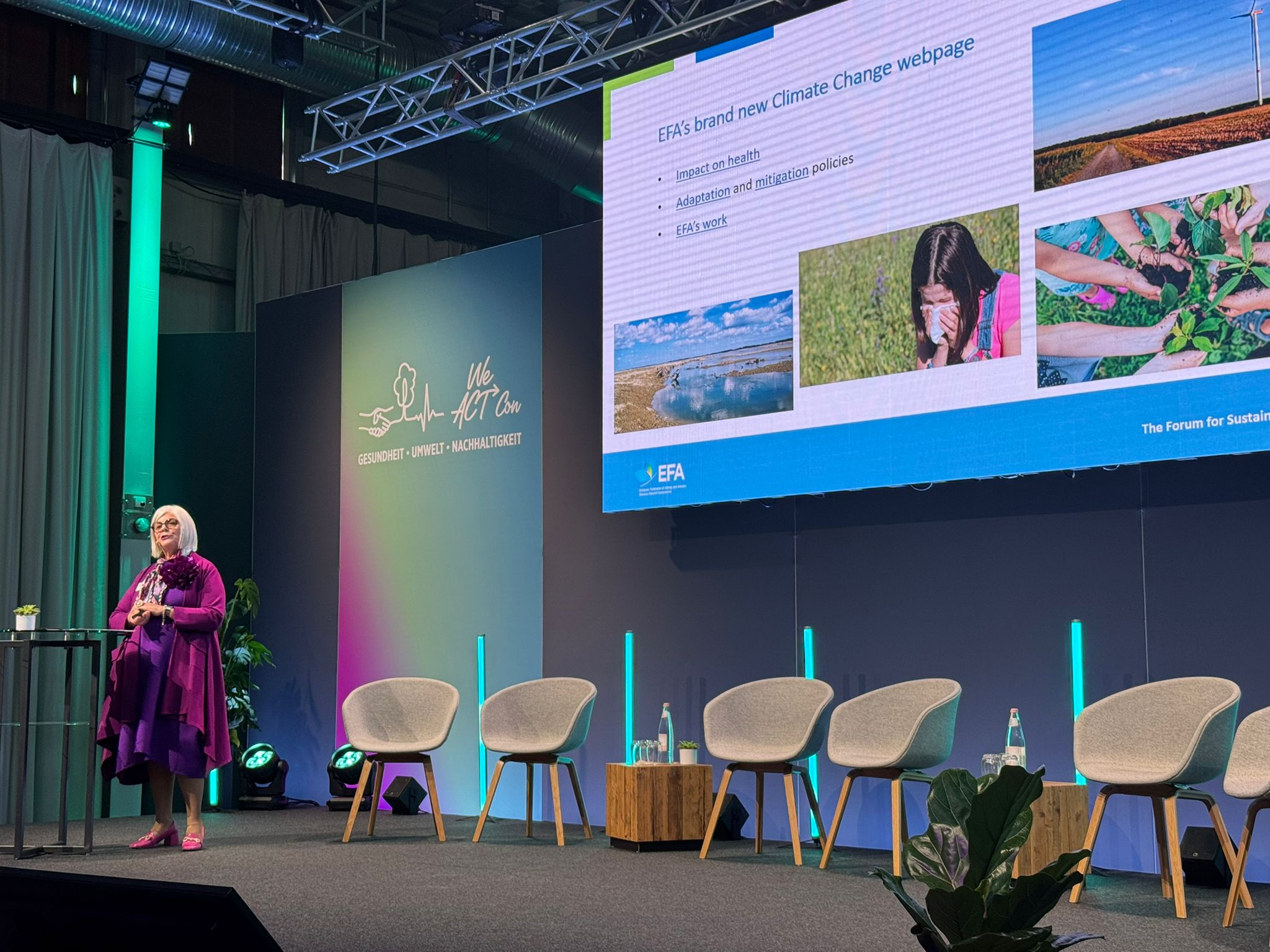
Marcia Podestà, EFA President
Prof. Dr. Alena M. Buyx highlighted the ethical dimensions of climate change, emphasizing its unequal effects on health equity. Meanwhile, Prof. Dr. Ilona Kickbusch presented the World Health Organization’s perspective, stressing the importance of a “health in all policies” approach to sustainable healthcare worldwide.
The impact of air pollution on respiratory diseases
Dr. Aoife Kirk, medical doctor and co-founder of Irish Doctors for the Environment, explained the global health risks posed by air pollution. She noted that 99% of the global population lives with pollutant levels above WHO guidelines. In 2020, air pollution caused 4.7 million deaths, with 1.3 million linked directly to fossil fuel use. Despite EU air quality targets, she emphasised that that air pollution in Europe contributes to respiratory and cardiovascular diseases, pregnancy complications, cognitive decline, and other health issues, disproportionately affecting vulnerable groups. She urged health professionals to take active roles in advocating for clean energy policies and educating patients about environmental risks.
Prioritising chronic respiratory diseases globally
José Luis Castro, WHO Director-General Special Envoy for Chronic Respiratory Diseases, highlighted that over 600 million people worldwide live with conditions such as asthma and COPD, leading to nearly 4 million deaths annually. He emphasised that despite the availability of effective treatments and tools, chronic respiratory diseases remain underdiagnosed and underfunded, especially in low- and middle-income countries.
Mr. Castro called for integrated, multisectoral action to include respiratory diseases in national health plans, improve access to diagnosis and treatment, and address root causes like pollution and tobacco use. He stressed the urgent need for policy reforms including healthcare system improvements to provide equitable care.
WeACT Con 2025 highlighted the critical need for cross-sector collaboration and policy integration to protect respiratory health amid environmental change.
WHO Europe’s first-ever report on chronic respiratory diseases – what’s in for patients and caregivers?
On 12 June, the World Health Organisation (WHO) Regional Office for Europe and the European Respiratory Society (ERS) published the first ever European report, “Chronic Respiratory Diseases (CRDs) and health equity by 2050 – spotlight on chronic obstructive pulmonary disease (COPD) and asthma in the WHO Europe Region.” As the organisation representing patients and caregivers in Europe, EFA analysed what’s in for people living with asthma and COPD for the next 2025 years.
WHO calls policymakers to address the growing issue of CRDs in Europe
Each year, 6.8 million people are newly diagnosed with CRDs in the WHO European Region[1]. Yet, these diseases are too often considered secondary while, in reality, they are at the core of deteriorating health and deserve stronger political and public health attention.
As a result of the overall approach to lung health, people living with CRDs are often neglected by healthcare systems, facing delayed diagnosis, barriers to care, and public health policies that fail to protect their lung health.
The launch of the WHO Europe report comes at a critical moment: ahead of the UN High-level meeting on NCDs in September 2025 and the subsequent formulation of the WHO European Programme of Work 2.0 for 2026-2029. The timing reinforces the urgency to elevate CRDs as a priority among NCDs more than ever.
The European-focused WHO report calls for countries in the region to adopt targets for asthma and COPD to enable implementation and progress monitoring at national, regional and global levels.
With this report, WHO Europe elevates asthma and COPD care as an issue of equity in Europe and underpins the principles adopted in the May 2025 WHA resolution ‘Promoting and prioritizing an integrated lung health approach’.
EFA highly welcomes this rights-based perspective, which reflects the patient evidence we have generated recently, like the Active Asthma and COPD Patients Access Care Report (2019) and COPD Standards of Care report (2024), highlighting the current gaps in care faced by asthma and COPD patients in Europe.
Health equity, diagnosis and access to care
The report confirms that 81 million people in the WHO European Region live with chronic respiratory conditions such as asthma and COPD. CRDs in the report are defined to include asthma, COPD, bronchiectasis, cystic fibrosis (CF), interstitial lung disease (ILD), pulmonary sarcoidosis, pneumoconiosis, and other chronic upper respiratory tract conditions.
Alongside extensive data and country examples initiatives, the report includes five patient testimonies that reflect the lived experiences of patients with CRDs.
CRDs contribute significantly to morbidity, disability and mortality, especially in relation to cardiovascular disease and cancer, the leading causes of death worldwide. This NCD burden leads to diminished quality of life and strong inequities, since respiratory diseases are highly debilitating.
According to WHO Europe, equity gaps are especially visible in areas such as access to care and rising medicine costs, and in the use of digital technology for health. At the same time, multiple overlapping crises in the WHO Europe Region, including pandemics, wars and climate change, exacerbate rising respiratory health inequities and strain healthcare systems, which are already struggling to address chronic conditions.
Strong links of asthma and COPD with other diseases
The report uncovers a wide range of risks for developing CRDs: behavioural risks (e.g. tobacco use), environmental and occupational exposure (e.g. indoor and outdoor pollution, geography, weather and temperature extremes, occupation) and metabolic risks (e.g. body mass index (BMI), frailty). Social and cultural factors including socioeconomic status, overcrowded housing, and smoking-related stigma also shape CRD burden and access to care.
High BMI, considered as obesity, is the leading risk factor for asthma and therefore higher weight gain in childhood is linked with childhood asthma. Meanwhile, low BMI is increasingly associated with exacerbations of COPD and an increased risk of death.
The report also highlights frailty as an important factor influencing quality of life and the overall care cycle for patients.
What’s the role for patients in the 2050 vision?
Patients and their representative organisations bring essential lived experience, offering insights into treatments and the full continuum of care, while helping shape knowledge and policy priorities and crucially, managing their own care. However, the WHO Europe report does not acknowledge the work and value of civil society and patient organisations in improving health and care, despite their existence being a response to gaps in healthcare and support, nor does it recognise the central and multifactorial role of patients themselves in managing their asthma and COPD.
At EFA, we believe that closer cooperation between all actors, including patients organisations, is part of the solution to improve prevention and care of respiratory diseases. EFA Community of members offer a wealth of knowledge and resources, including peer support, community support, and patient advocacy, and connects policy makers to patients’ realities and needs.
While the report makes a reference to EFA’s DIG_IT Project and our Dutch member organisation, Longfonds’s training programmes, those acknowledgements are brief and do not reflect the full scope of patient organisations' work. The report overlooks how patients and patient organisations help fill healthcare gaps, including through peer support and efforts to address dysfunction between different levels of care in CRD management.
Therefore, we stand ready to collaborate with WHO Europe and the European Respiratory Society to improve prevention, care and equity for people living with asthma and COPD.
Next steps
EFA congratulates our partner, the ERS, for this important collaboration with the WHO Regional Office for Europe.
The report is a major tool which can be used at national level, to push for improved detection, treatment coverage and control of asthma and COPD.
As presented during EFA’s recent debate on lung health and COPD in the European Parliament’s health committee, EFA will continue to advocate for CRDs to be featured in the high-level UN meeting.
Read the WHO Report on Chronic Respiratory Disease here.
[1] GBD Compare [website]. Seattle, WA: Institute for Health Metrics and Evaluation; 2025 (http://vizhub.healthdata.org/gbd-compare).
May contain...or maybe not: EFA Community calls for clear and reliable allergen labelling
At first glance, a label like “may contain peanuts” might seem like a minor note on food packaging. But for people living with food allergies, it can mean the difference between enjoying a meal and going to the emergency room. That is why EFA and our food allergy community are calling for clear and harmonised rules on precautionary allergen labelling (PAL).
EFA has responded to the recent consultation launched by the Codex Alimentarius Commission, calling for stronger international guidelines on PAL. These guidelines set the international standard beyond Europe and will determine how allergen risks are communicated on food packaging and how confidently people with food allergies can choose what to eat.
PAL is a must for food allergy safety
We are asking for PAL to become mandatory and used only when there is reliable evidence that a product may contain unintended traces of allergens. We insist on the evidence because at the moment, PAL is applied too broadly in the food sector, often used when there is no proof of risk, and worded in many different ways. This practice might be seen as legally covering business in case of problems, but it limits food choices and creates uncertainty for patients.
What we need is a system where PAL is based on real risk, not assumptions. This means clear rules on when and how PAL is used, supported by scientific thresholds and a proper food quantitative and/or qualitative risk assessment, so that people with food allergies can better trust what they read on a label and the food industry as a whole.
We also recommend placing PAL directly under the ingredient list using one clear and consistent format. For example, “may contain [allergen]”. Our community sustains that offering multiple options or vague alternatives would weaken the guidelines and lead to inconsistent labelling across countries.
One standard for everyone, everywhere
As food is a global market, being produced and sold, PAL must work the same way in every European country. We do not support proposals that would allow national or regional authorities to set their own reference doses on allergen risk, as this would lead to differing thresholds across markets, different labelling, and confusion for patients.
A single, harmonised approach to allergen labelling is the only way to ensure that food allergy safety is not left to chance, no matter where a product is bought or consumed.
In addition, we welcome that the Codex Alimentarious Commission is open to hear novel ideas about how PAL should be presented, including EFA’s suggestions. EFA continues to strongly support the introduction of a mandatory Comprehensive Allergen Statement on packaging, bringing together all allergen-related information such as ingredients, PAL, “free-from” claims, and risk assessment in one place.
Education and training
To make PAL effective, it is important that everyone involved in the food chain understands how it works. We have called for education and training to be a central part of the guidelines, targeted at all involved stakeholders, including food business operators, health professionals, national authorities, and consumers.
Understanding how PAL is applied and why specific thresholds are used can help avoid miscommunication and ensure that food allergy risks are managed effectively.
#EFACommunity position on PAL
This consultation response was developed together with our Food Allergy Working Group, through close collaboration with our national members. We are grateful to Food Allergy Italia, the Dutch Food Allergies Foundation, the German Allergy and Asthma Association (DAAB), the Luxembourg Allergy Network, and the Spanish Association for People with Food and Latex Allergy (AEPNAA) for their time, input, and dedication.
We believe that everyone deserves to feel safe when choosing food. To make that possible, we need reliable and consistent labelling. EFA will continue working closely with our community to ensure precautionary allergen labelling that truly protects patients.
EFA is looking forward to contributing to the next steps in the development of the Codex PAL Guidelines.
You can find EFA submitted response here.
Making travel easier for people on oxygen: a new initiative from EFA
For people who rely on oxygen, like chronic obstructive pulmonary disease (COPD) patients, travelling can be challenging—but not necessarily for the reasons you might think. In most cases, the difficulty isn’t just medical. It’s the paperwork, unclear information, and complicated procedures that make travelling with oxygen unnecessarily overwhelming.
That’s why the European Federation of Allergy and Airways Diseases Patients’ Associations (EFA) is working closely with its COPD Community on a new project, ‘Travel as a COPD patient in Europe’, designed to make travel easier, taking some of the burden around travelling off patients’ shoulders. The goal is to support respiratory patients in need of oxygen therapy, in understanding the procedure for travelling with medical oxygen bottles and concentrators, and get new oxygen at destination, so they can travel more safely, easily, and confidently.
The real barriers to travelling with oxygen therapy
Travelling with oxygen means more than just booking a trip. Patients and caregivers need to consult with their national healthcare system for advice and prescriptions, coordinate with oxygen providers, comply with airline or train regulations (because medical oxygen is a gas and has explosive potential), and ensure support is available throughout the trip and at destination to purchase and refill oxygen.
As for getting any other medical treatment outside of the place of residence, these steps can involve several organisations in different countries, language barriers, long waiting times - sometimes even months - and uncertain insurance coverage in case of problems. For many, it becomes too stressful to manage.
A collaborative, patient-centred approach to support patients travelling with oxygen therapy
To address these challenges, EFA is mobilising its COPD Community to offer structured, accessible support across Europe. The project has several key components:
- National Contact Points: EFA is setting up a network of trained experts within its member organisations across Europe. These National Contact Points can support patients before and during their journeys by offering guidance, sharing resources, and facilitating cross-border procedures.
- A comprehensive toolkit: We are developing a patient-friendly travel toolkit containing everything from key contacts and planning checklists to relevant online resources. Designed to be clear and easy to use, the European toolkit will help patients plan and manage their trips with greater confidence.
On June 19th , we held our first workshop with the COPD Community. The session was insightful and interactive, gathering perspectives on the current travel landscape and identifying patients’ needs across different countries. Together, we discussed the roles of National Contact Points and the structure of the toolkit and guidelines to best serve patients and caregivers.
Often, the information needed for travelling with oxygen exists—but it's outdated, fragmented, or not available in all languages. Travelling isn’t just about holidays. It means visiting family, attending important events, and making patients’ voices heard in decision-making spaces. Complex procedures shouldn’t stand in the way of these vital experiences.
Building on EFA’s previous work on enabling air travel with oxygen in Europe and the related advocacy work, this project is part of EFA’s larger COPD Beyond Care project, aimed at improving the quality of life of patients with COPD, as well as access to treatment, care, and adequate support. Earlier this year we launched the new report “Raising the bar for better standards of care for COPD in Europe”, which provides critical insights and recommendations on care gaps, prevention needs and the cost of managing this chronic respiratory disease. In the same line and in a context of rapidly changing travel market and regulations, the work on “Travel as a COPD patient in Europe” aims to ensure that travel becomes an option, not a burden, for COPD patients on oxygen.
EAACI 2025 Congress - our highlights on patient leadership and expertise
The European Academy of Allergy and Clinical Immunology (EAACI) Congress 2025 took place in Glasgow from June 13 to 16 under the thrilling theme “Breaking Boundaries in Allergy, Asthma, and Clinical Immunology: Integrating Planetary Health for a Sustainable Future.”
With more than 200 scientific sessions, the conference showcased the latest evidence and fostered collaboration among clinicians, researchers, industry leaders, and patient organisations from around the world. As patients living with allergy and airways diseases, we are aware of the environmental, climate and treatment-related factors that affect our symptoms and quality of life daily.
For four days, we learned and exchanged with scientists, researchers and healthcare professionals in allergology, putting patients more than ever at the center, and connecting their experiences with both local environments and broader planetary trends.
The Congress sessions spanned the full scope of the allergy and asthma field, from challenges in testing, diagnosis, and management to the latest advances in our understanding of allergic diseases and multidisciplinary approaches to address them.
From an EFA perspective, three aspects stood out during the Congress:
- First, the link between allergic diseases and the natural environment, reinforcing the urgency to address climate change and biodiversity loss.
- Second, the ongoing challenges in diagnosis and treatment of allergic diseases, especially in children
- Third, the key role of patient organisations in ensuring that medical guidelines are actually implemented on the ground
The EAACI Patient Organisation Committee (POC), where EFA is an active member, convened to reflect on 2024 achievements and future priorities.
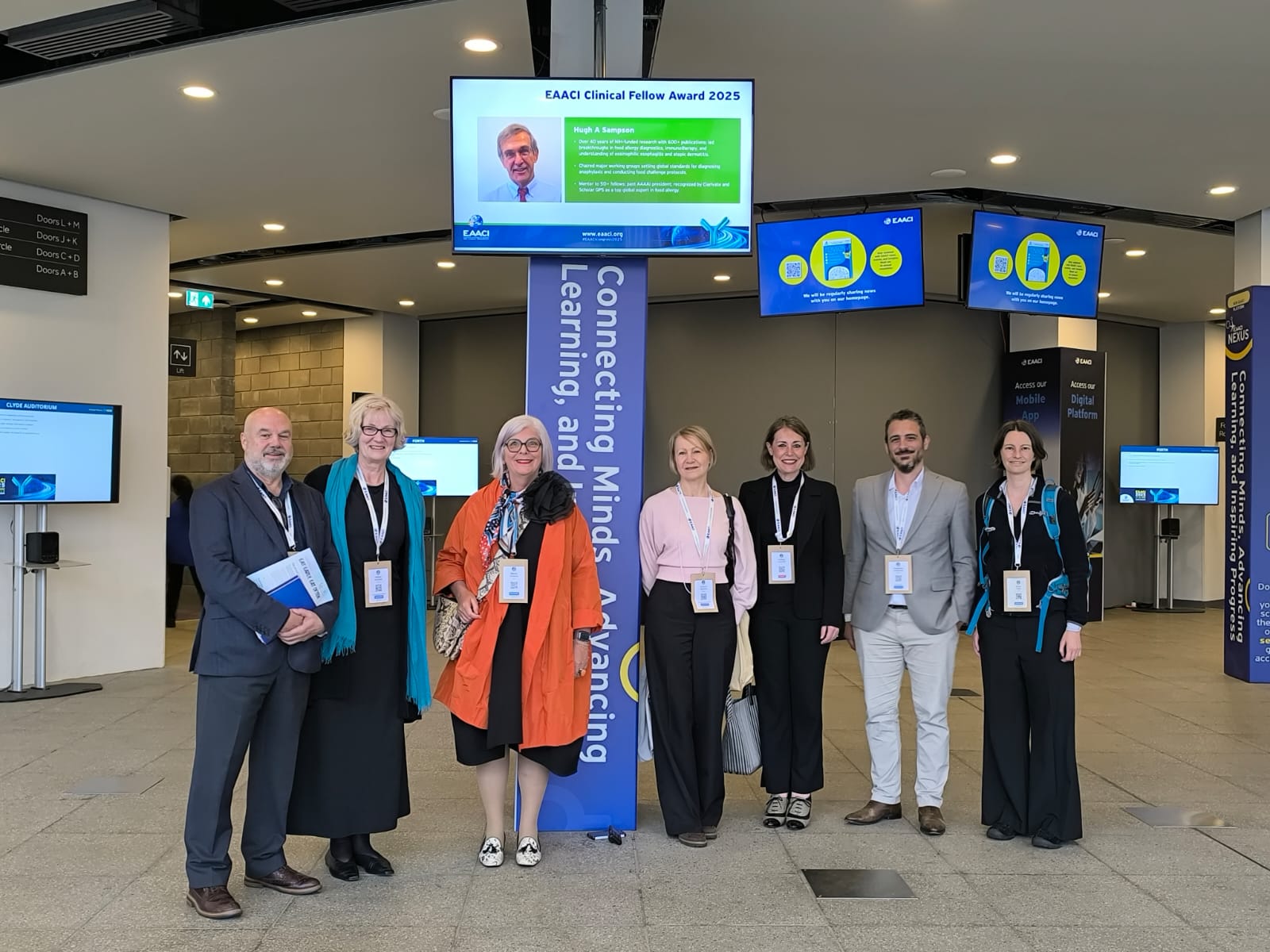
From left to right: Ángel Sánchez (AEPNAA), Sabine Schnadt (DAAB), Marcia Podestà (Food Allergy Italia), Susanna Palkonen (EFA), Panagiotis Chaslaridis (EFA) and Emma Cook (ATOPICCO Network for Children of the Earth)
EFA was proud to see members of our community contribute as official EAACI POC members, playing leading roles in the congress programme and demonstrating how patient expertise is driving progress:
Sabine Schnadt (DAAB, Germany) chaired a Patient Organisation Committee session on Precautionary Allergy Labelling (PAL). She steered the debate on improving allergen information on food products, highlighting patient concerns and presenting EFA’s advocacy at the Codex Alimentarius Commission for clearer labelling.
Pascale Couratier (AFPRAL, France) spoke on food allergy, drawing attention to the risks of hidden allergens in everyday products and calling for greater research efforts to protect patients.
Ángel Sánchez (AEPNAA, Spain) delivered a keynote presentation on planetary health and sustainability. He explored how climate change and biodiversity loss are increasingly linked to allergic diseases, and called for collective action, with patient organisations as drivers of change under the One Health approach.
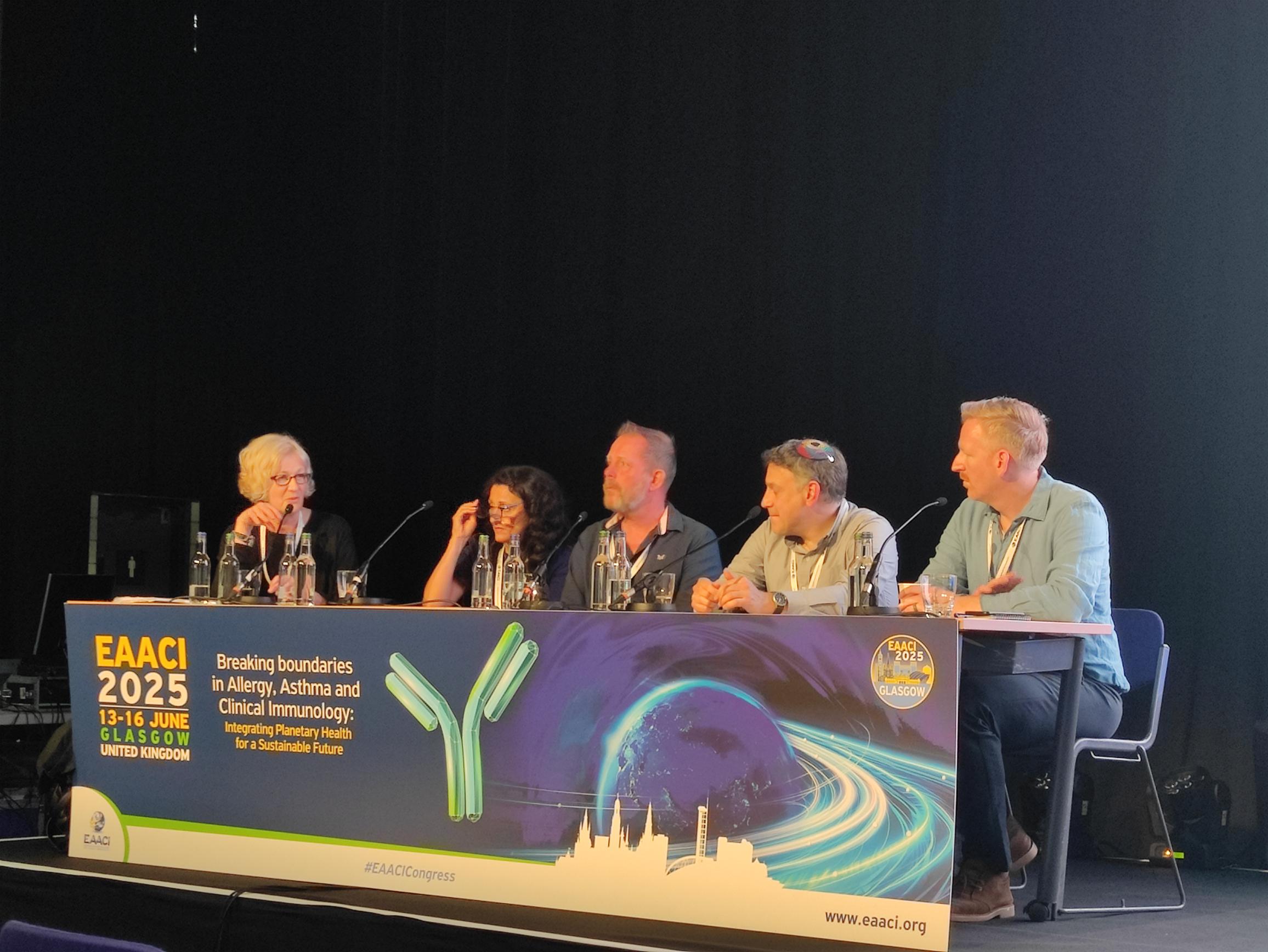
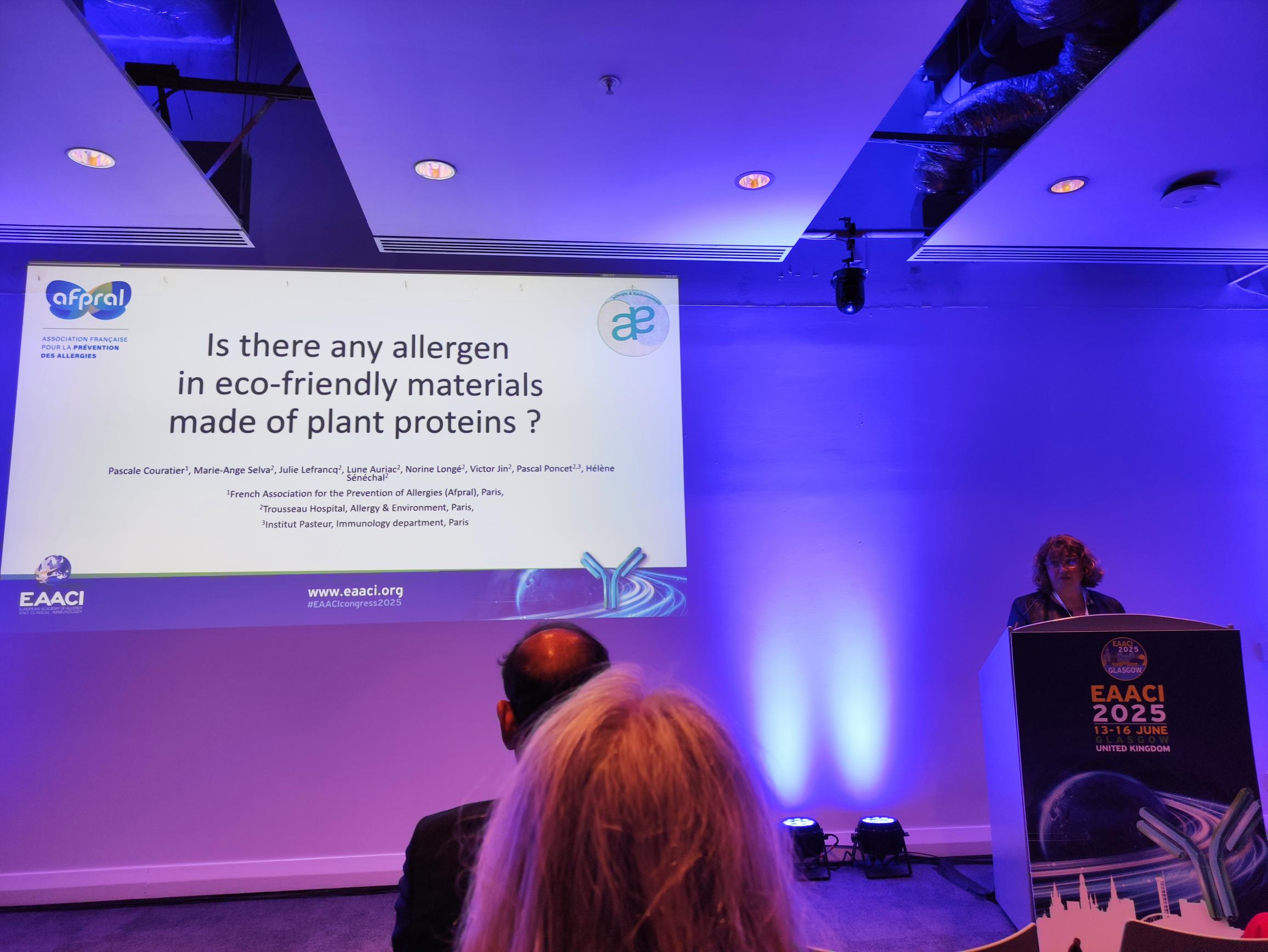
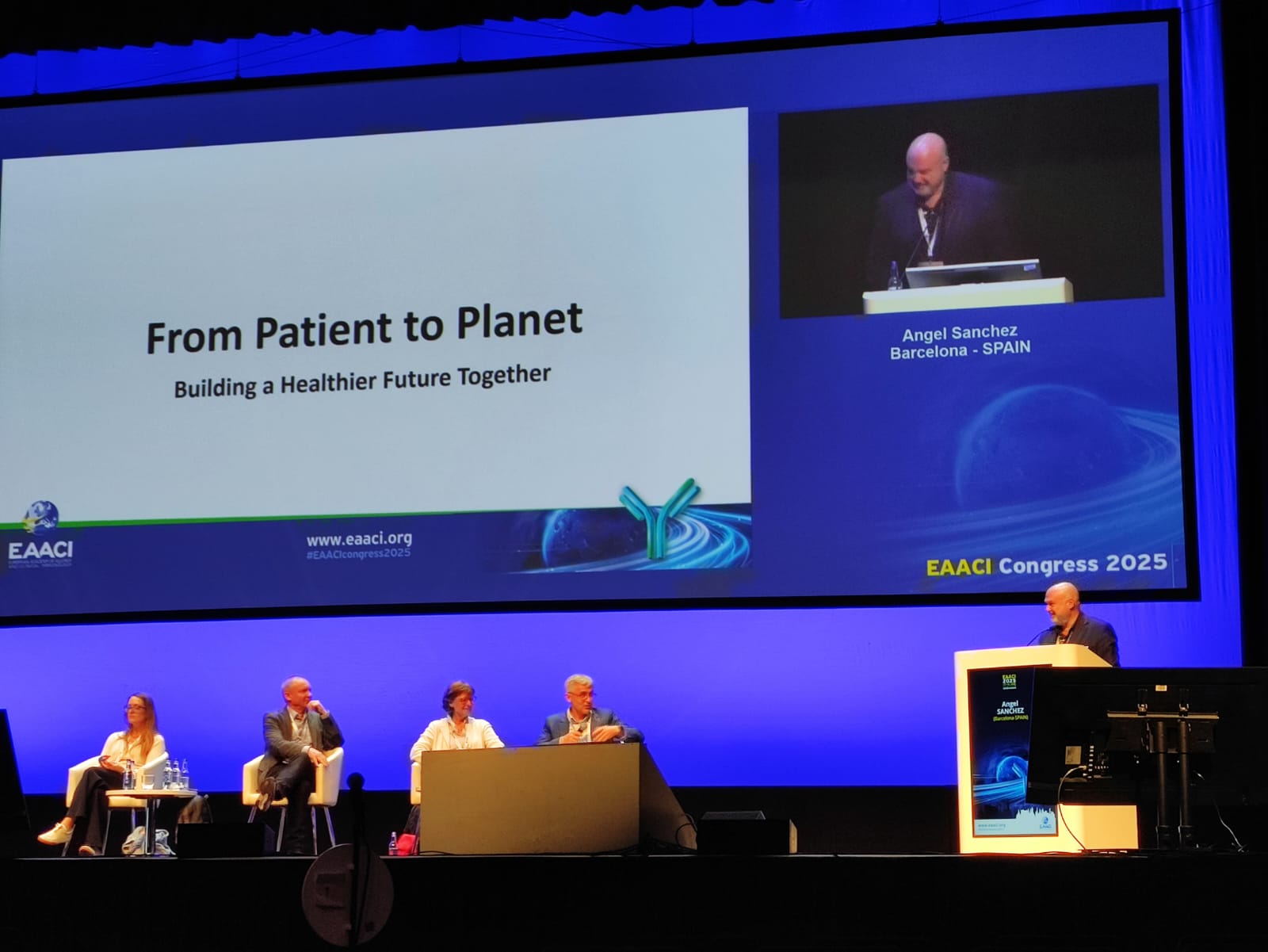
From left to right: Sabine Schnadt (DAAB), Pascale Couratier (AFPRAL) and Ángel Sánchez (AEPNAA)
Tina Mesarič (Institute Atopika, Slovenia) presented in a session on atopic dermatitis, sharing survey results that revealed the emotional toll and daily challenges faced by patients. She urged healthcare providers to deliver personalised, multidisciplinary care that looks beyond the symptoms.
Cristina Jacomelli (Respiriamo Insieme, Italy) presented during a symposium on exercise and asthma management, sharing initiatives that connect asthma care with nature, sport, and community to support patient well-being.
Amena Warner (AllergyUK, United Kingdom) spoke in a session on communication with allergy patients in primary care, emphasising the vital role of patient organisations in ensuring information is clear and accessible.
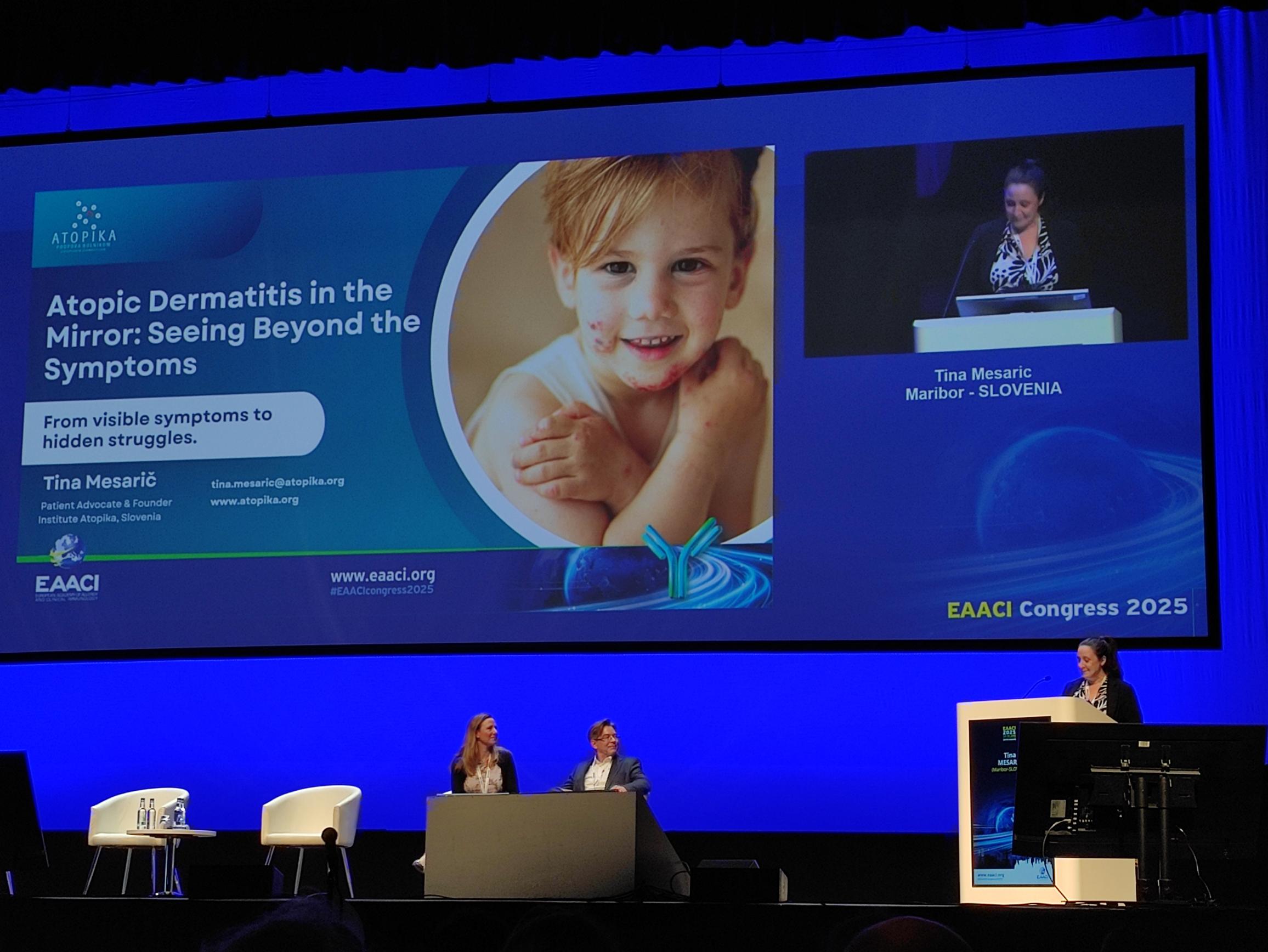
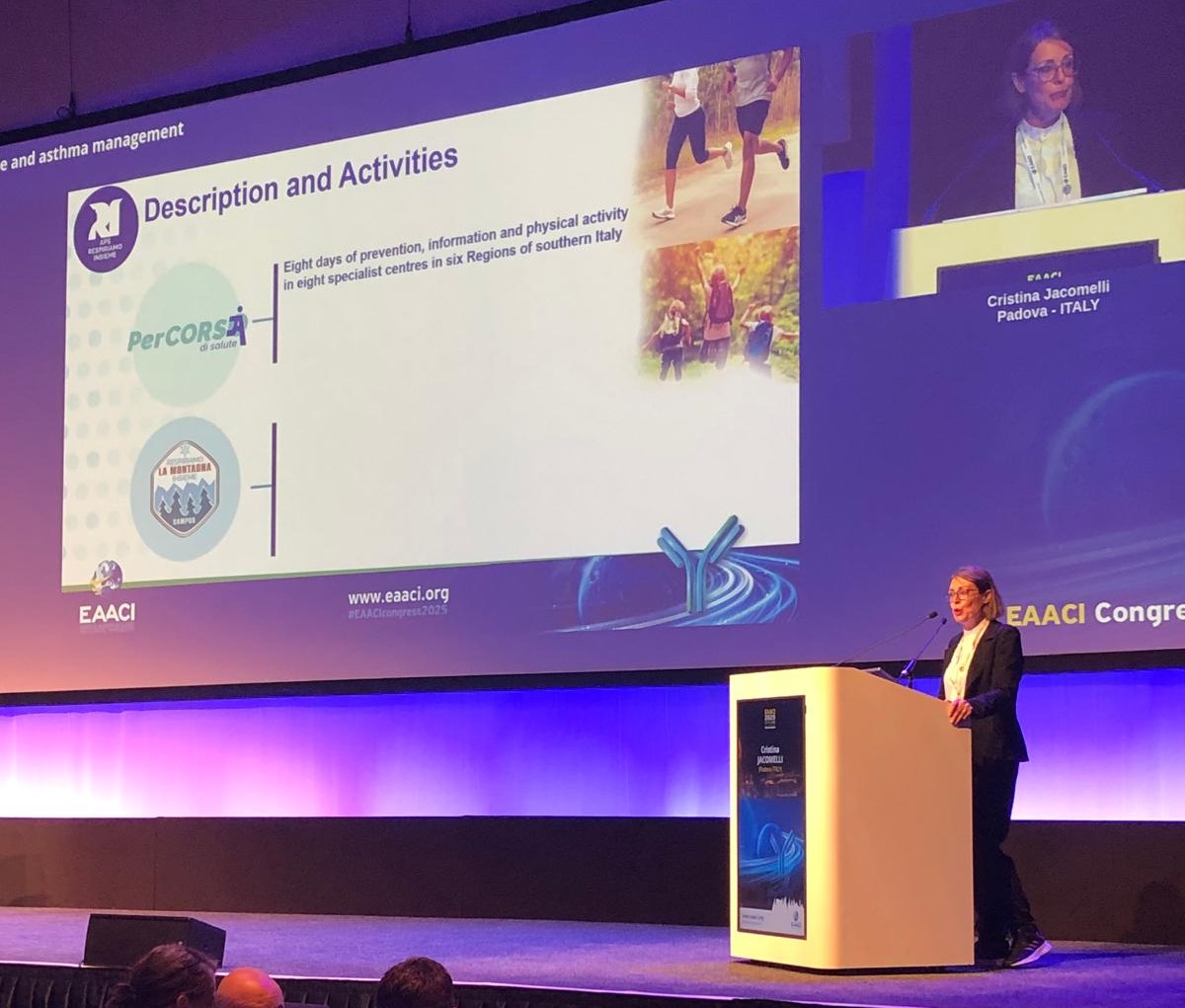
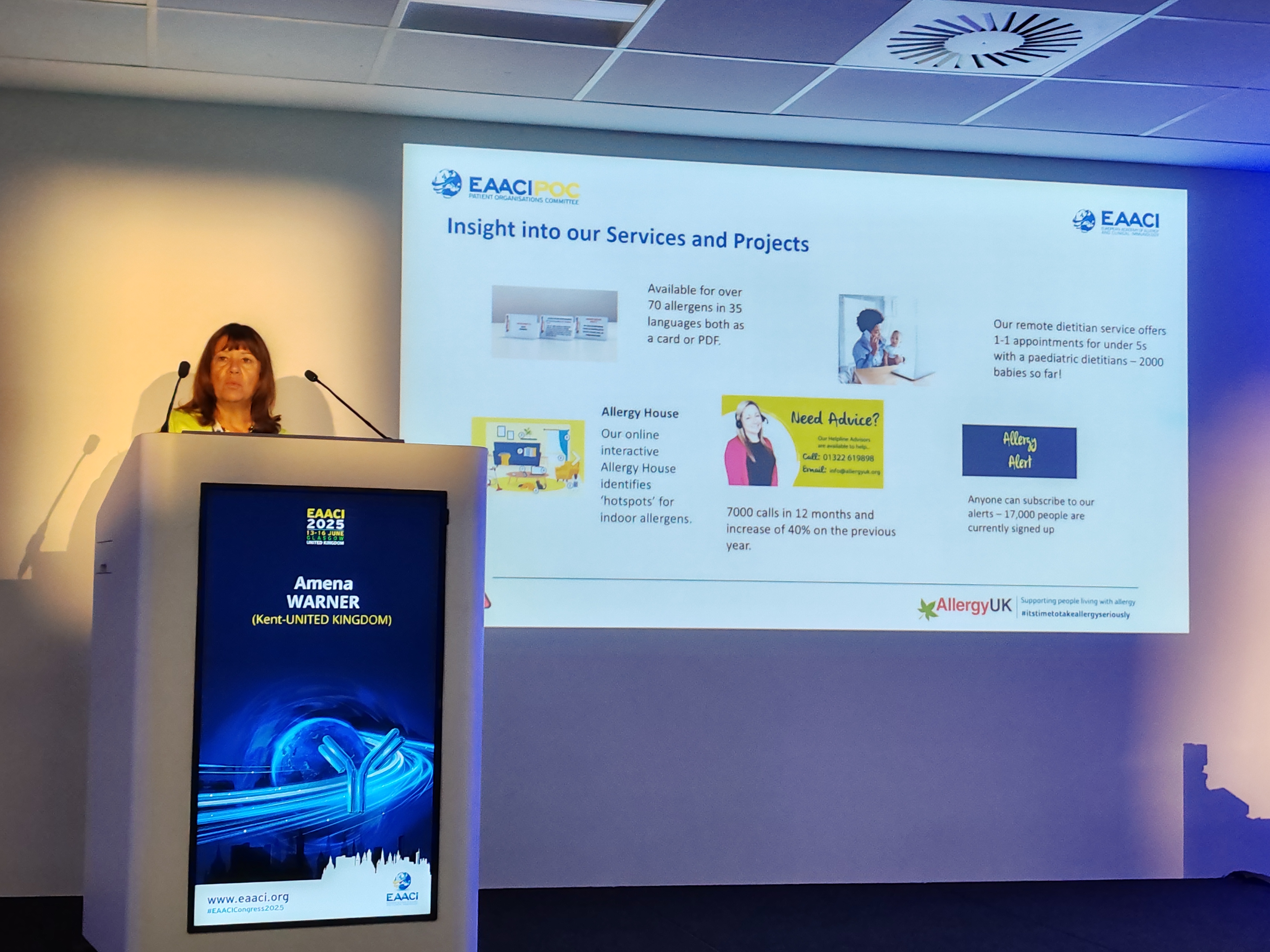
From left to right: Tina Mesarič (Institute Atopika), Cristina Jacomelli (Respiriamo Insieme) and Amena Warner (AllergyUK)
Beyond the lecture halls, members of the #EFACommunity came together at a community dinner to network at every opportunity
EFA is looking forward to strengthening collaboration with EAACI and all partners to put patients at the center of allergy policy, research, care and prevention at the European level, and across the region. We were also glad to connect with our global partners from Global Allergy and Airways Platform (GAAPP), reinforcing our shared commitment to advancing patient-centred care worldwide.
EFA brings COPD to the European Parliament Health Committee debate
On 3 June, the European Parliament’s Committee on Public Health (SANT) held its first-ever dedicated exchange of views on lung health and chronic obstructive pulmonary disease (COPD), marking a significant step towards the broader recognition of respiratory health in the EU.
Building on the momentum of our February COPD event in the European Parliament, the hearing served to reflect the growing support for better EU-level action on chronic respiratory conditions. It also followed the adoption of a historic WHO resolution on lung health, which was a major global win for asthma and COPD patients.
With 11 Members of the European Parliament (MEPs) present and translation provided in 14 languages, the debate reflected wide cross-party and geographic engagement. The discussion focused on improving prevention, early diagnosis, and care for the more than 36 million Europeans living with COPD and other chronic respiratory conditions.
The European Federation of Allergy and Airways Diseases Patients’ Associations (EFA) joined the panel to represent the patient perspective, alongside the European Respiratory Society (ERS), who provided the medical background on COPD and highlighted how enhanced prevention and care can save lives.
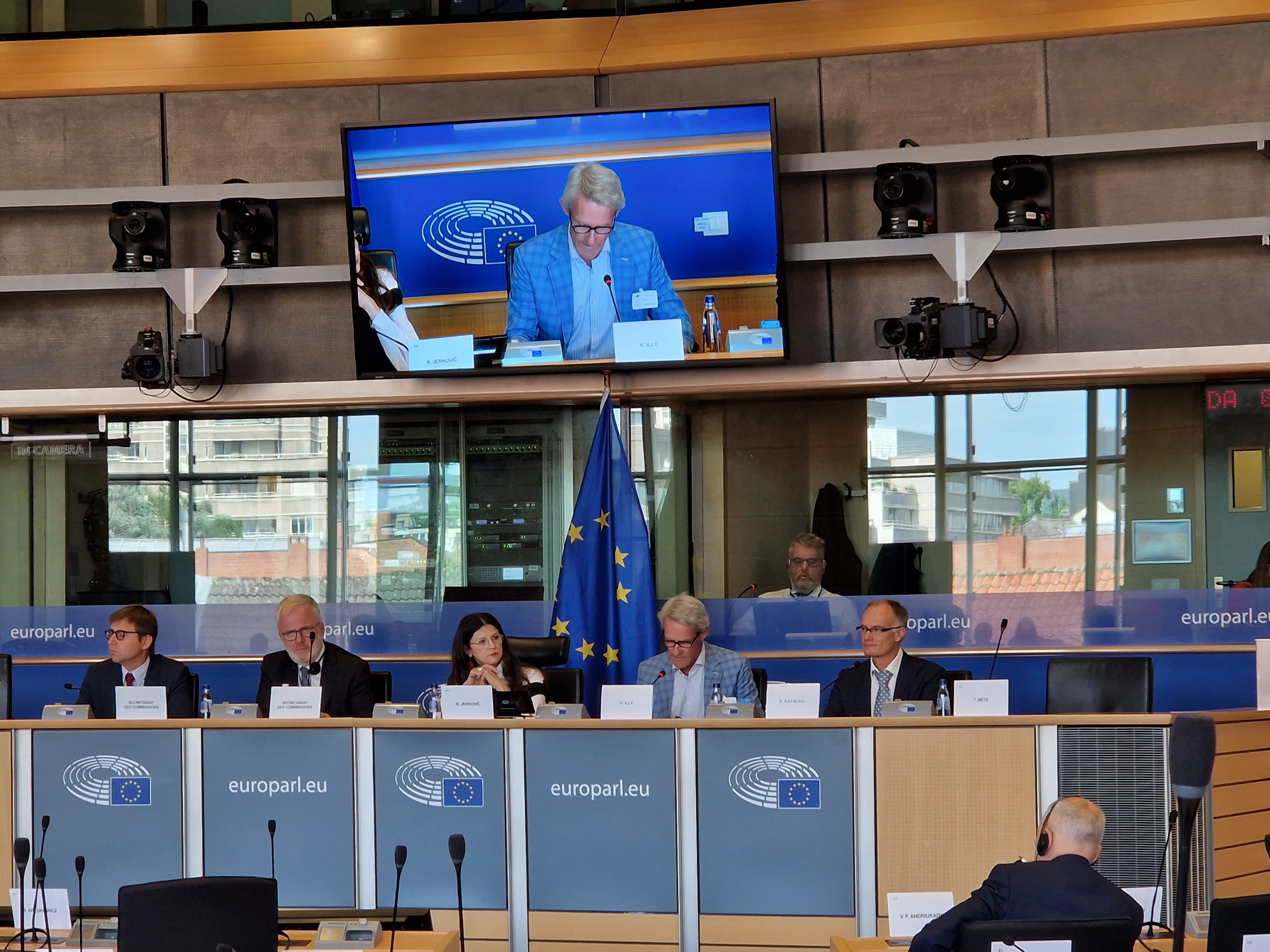
SANT Committee hearing at the European Parliament
Patients and healthcare professionals ask the EU to take decisive action on COPD
COPD remains a leading cause of preventable death in Europe, yet it continues to receive limited political attention. The June hearing aimed to address that gap by giving space to both the science and the people affected by this debilitating disease.
Representing clinicians, Professor Didier Cataldo of the European Respiratory Society underlined the urgency: “COPD is the third leading cause of death globally and remains largely underdiagnosed in the EU.” He called on Parliament to act through increased funding for research, investments in early detection tools, and support for national respiratory health strategies, especially ahead of the upcoming UN High-Level Meeting on Non-Communicable Diseases (HLM4).
Károly Illy, Vice-President of EFA, brought the voice of the patient community, stressing that COPD is not only fatal but deeply affects daily life. “If current trends continue, COPD will affect 49 million people in the EU and cause 9% of all preventable deaths,” Illy said. “The EU must adopt decisive policies that place patients at the centre, enabling early diagnosis, equitable access to care and support systems that allow patients to actively manage their health.”
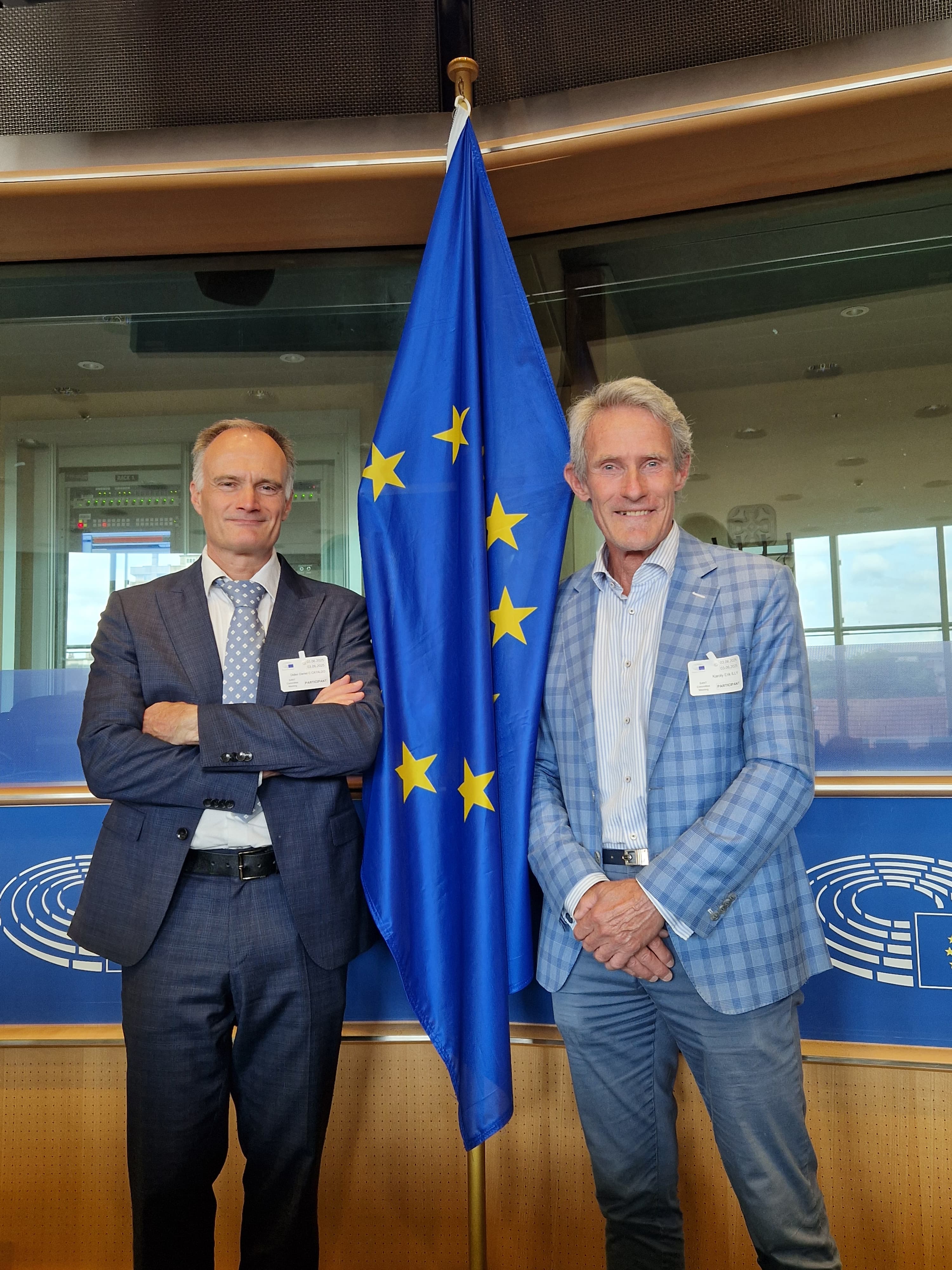
Karoly Illy (EFA Vice President) and Professor Didier Cataldo (ERS) at the hearing
EFA called on the European Parliament Health Committee to take four concrete actions to change the course of COPD across Europe:
- Champion a motion to prioritise COPD ahead of the September UN High-Level Meeting on Non-Communicable Diseases (HLM4)
- Investing in diagnostic tools under EU health programmes to improve early detection and diagnosis
- Prioritise COPD in EU financial instruments, such as EU4Health and Horizon Europe
- Update EU tobacco legislation to protect youth and deliver a #SmokefreeGeneration by 2040
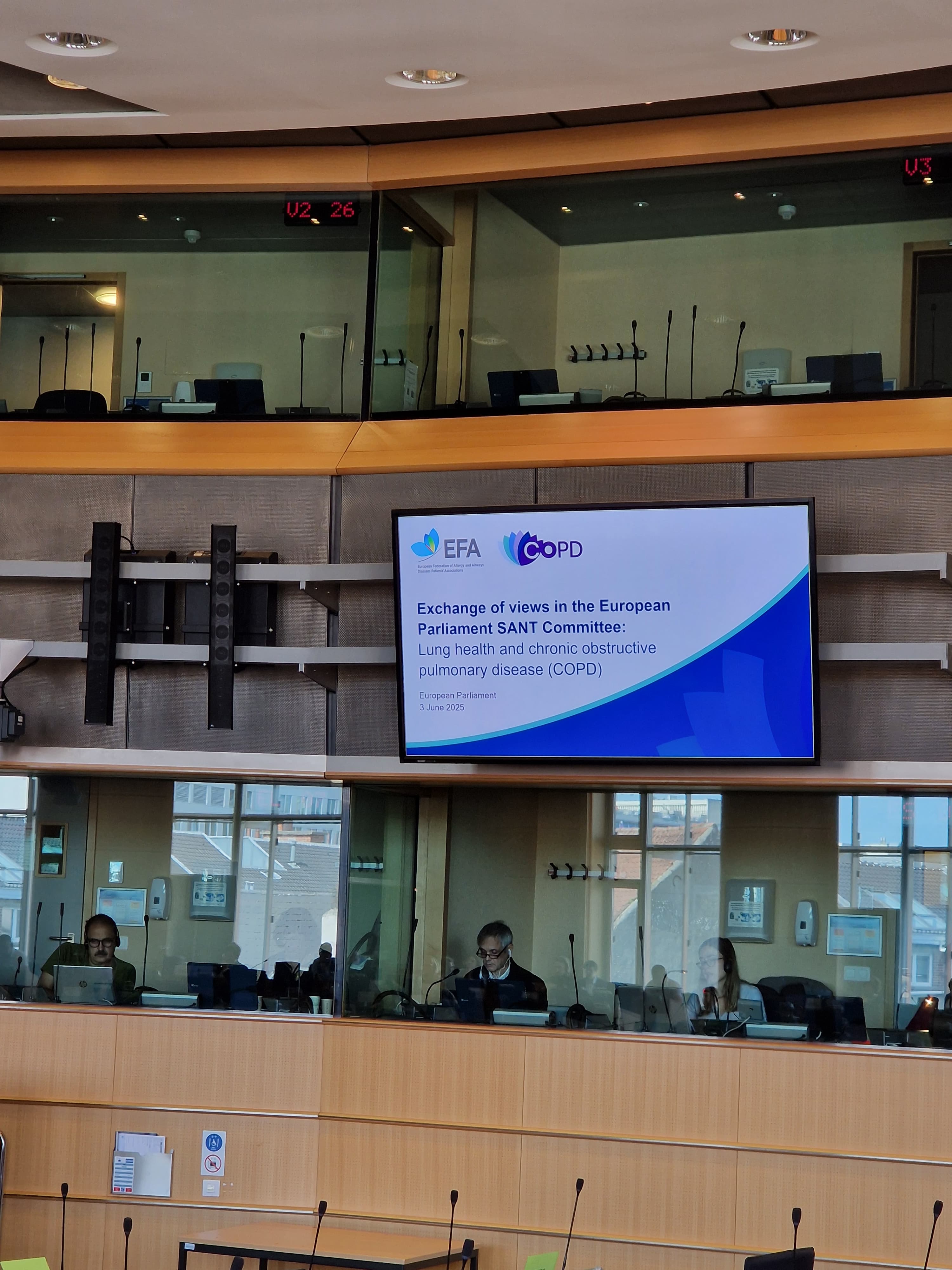
MEPs show strong cross-party support to #KeepBreathing
The exchange saw widespread engagement from MEPs, many of whom drew attention to the links between lung health and broader environmental and social challenges, as well as welcomed the voices of patients in the room.
MEPs Tomislav Sokol (Croatia, EPP) and Gerald Hauser (Austria, PfE) highlighted the impact of air pollution from different sources but especially from traffic and domestic heating on respiratory health. MEP Ondřej Dostál (Czech Republic, ECR) highlighted indoor air quality and the role of building standards in reducing harmful exposures.
On prevention, MEPs Aurelijus Veryga (Lithuania, ECR) and Nicolás González Casares (Spain, S&D) advocated for stronger EU regulation on tobacco and new nicotine products. “There is already scientific evidence that these new smoking products are toxic,” said Casares. “We cannot let commercial interests prevail over public health.”
Responding to concerns about vaping and youth addiction, Károly Illy cautioned: “Once addicted to nicotine, the brain will continue to ask for it. Vapes and new nicotine products are not harmless alternatives, but a gateway. We need to protect our youth.”
Vytenis Andriukaitis, former European Commissioner for Health and current MEP (Lithuania, S&D), called for a more integrated approach to NCDs: “Non-communicable diseases like COPD, cancer, diabetes, cardiovascular disease, they are all interconnected. We cannot tackle one and ignore the others.”
MEP Andras Kulja (Hungary, EPP) stressed the need to use health data to improve early diagnosis and treatment pathways across Europe.
Policy change for stronger COPD standards of care
This hearing marks an important step in building political awareness and momentum for stronger EU action on lung health. Building on evidence from EFA’s COPD Standards of Care report and the European Lung Health Group’s #KeepBreathing campaign, the discussion reinforced the need for an EU response that reflects the scale of COPD.
EFA reiterated its commitment to work with institutions and national governments to ensure that people living with COPD have timely access to diagnosis, high-quality treatment, and supportive environments that allow them to #KeepBreathing.
As policymakers look ahead to potential updates on EU health and tobacco frameworks, the call from patients and doctors alike is clear: COPD must move up the political agenda.
Watch the full recording of the debate here.
Follow our updates on EFA Linkedin page and the ELHG Linkedin page.
EU consults on its first Stockpiling Strategy: EFA recommendations
In an era marked by pandemics, geopolitical tensions, and climate-related disasters, the European Union has taken a bold step forward by adopting the first Preparedness Union Strategy in March 2024. At the heart of this policy lies another initiative, the EU Stockpiling Strategy, which focuses on ensuring the availability of critical goods and materials, including medicines, to face crises both at national and EU-level. This strategy will play a major role in protecting the safety and lives of allergy and airways disease patients.
EFA welcomes the European Commission’s plans for an EU Stockpiling Strategy, and agrees that it needs to be based on an all-hazards, whole-of-government and whole-of-society approach. The strategy has the potential to reinforce the EU-wide security of medicine supply and continuity of care, supporting patients’ access to healthcare services.
The European Commission European Civil Protection and Humanitarian Aid Operations (DG ECHO) is in charge of the file and launched a call for evidence on the EU Stockpiling Strategy. EFA responded with patient-centric recommendations for the Commission to consider to make the strategy work for health:
EFA key recommendations for EU stockpiling
- Prioritise patient access to medicines in emergencies
Medicines are fundamental and must remain accessible during crises. EFA highlights that stockpiling should prioritise patients’ straightforward access. The strategy should also especially reflect vaccination to ensure timely and equitable immunisation, especially against crisis caused by pathogens.
- Ensure medicines reach patients
Stockpiling strategies must consider how medicines are delivered, not just their storage. Mobile units and home delivery systems are essential to reach patients who cannot easily access healthcare facilities.
- Include generic and non-allergenic medicines
Generic medicines are cost-effective and allow for larger reserves, making them ideal for stockpiling. Non-allergenic vaccines should also be considered to ensure safe intake and immunisation for patients at risk of severe allergies.
- Guarantee medicine safety and transparency
The EU must monitor expiry dates and maintain cold-chain logistics to ensure medicine safety. Clear, science-based data and public communication is also vital to develop public health literacy, counter misinformation and build public trust.
- Coordinate medicine supply across the EU
A harmonised EU framework is needed to ensure solidarity between Member States is at the core of the EU stockpiling strategy. Coordinated monitoring and distribution can ensure fair access to essential medicines during emergencies.
- Strengthen EU procurement and supply chain resilience
EU procurement practices should prioritise supply chain resilience and emergency responsiveness. Joint EU procurement can help secure better terms and ensure equitable access to critical medicines among Member States.
- Recognise climate hazards in stockpiling plans
Climate change increases demand for respiratory medicines and disrupts supply chains. Stockpiling strategies must be climate-resilient to protect patients during extreme weather events.
EFA calls on the European Commission to put patients at the heart of the EU Stockpiling Strategy. By addressing these recommendations, the EU can build a more resilient, equitable, and patient-centred health emergency preparedness system.
To find out more, read our response to the consultation, here.
Read our resopnse on the EMA Critical Medicines List here.
GlobalSkin Conference 2025: EFA Takeaways
From 24 to 27 April, EFA President Marcia Podestà represented the EFA atopic eczema community at the GlobalSkin Conference in Prague. The event gathered over 250 leading dermatology patient organisations from across the world, including some EFA members.
The meeting fostered an atmosphere of solidarity, compassion, and collective purpose. During four days, participants highlighted the real-world challenges faced by people living with skin diseases, including stigma and isolation, mental health issues, and difficulties in accessing care.
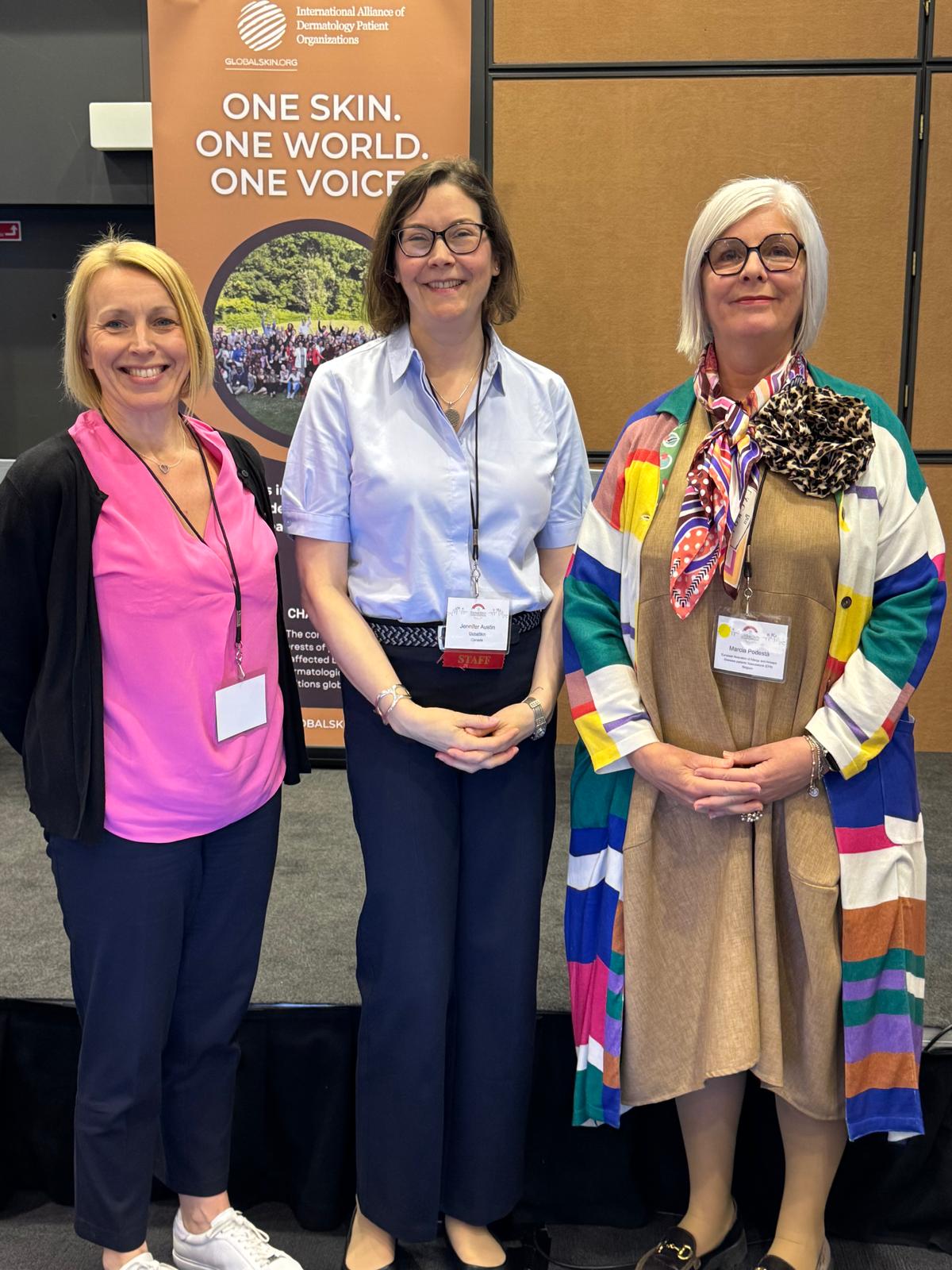
From left to right, Simone Miles (EFA Treasurer), Jennifer Austin (GlobalSkin CEO)
and Marcia Podestà (EFA President)
The conference provided the space for specific disease communities to connect, and EFA was delighted to exchange knowledge, and explore new collaboration models, including regional ones. Topics ranged from advancing health equity and integrating mental health support into dermatology to strengthening organisational governance and driving digital engagement.
As part of the GlobalSkin EU Regional Network discussions, EFA President emphasised the need to identify common priorities in Europe, such as access to care, mental health, shortages, the collection of data on skin diseases and how they affect young patients. During the conference, the network also discussed the members’ common issues, what needs to be done collectively to solve them and how the community could support the achievement of national goals. Participants agreed on the urgent need for continued advocacy.
Importantly, the Conference’s sessions brought together patient leaders, reinforcing the patient’s role as a central stakeholder in their own care.
In the context of growing momentum generated by the recent adopted WHO resolution on skin diseases, the GlobalSkin conference was more than just an event. For EFA Community it was an opportunity to connect with the local community, share our regional work and be active players in this global movement.
As one attendee put it: “We arrived as individuals with different stories, but we leave as one voice — stronger, wiser, and ready to champion change.”
European Parliament health committee to discuss lung health and COPD with EFA
On 3 June, the European Parliament’s health committee (SANT) will hold an exchange of views on ‘Lung health and chronic obstructive pulmonary disease (COPD) during its committee meeting. This means that, for the first time, the specific issues of lung health and COPD will be discussed at the official committee of the European Parliament, marking a significant step towards the broader recognition of respiratory health in the EU.
EFA welcomes the growing interest of the European Parliament to prioritise lung health. We are delighted to have been invited to contribute the perspective of patients and advocates in this committee discussion, alongside our partner, the European Respiratory Society (ERS).
What is an exchange of views?
This discussion builds on the momentum from the launch of EFA’s European report on COPD Standards of Care in February. We celebrate that the collective work of EFA Community of patients will be reflected in this high-level exchange.
In the European Parliament, an exchange of views is a formal dialogue where Members of the European Parliament (MEPs) hear directly from external experts to better understand an issue and support informed policymaking.
Join the discussion!
The draft agenda of the SANT committee meeting indicates that the session will take place between 9.00 and 12.30, and the exchange of views towards the end of the debate. EFA invites you to follow the web stream of the debate on the European Parliament’s website, here.
Learn more:
EFA COPD report: Raising the bar for better standards of care and our policy recommendations
Strengthening EU health security: EFA’s vision for patient-centred medical countermeasures
In recent years, Europe has been confronted with overlapping threats to public health. The COVID-19 pandemic, climate-related disasters and war at its borders have all revealed vulnerabilities in health systems' capacity and supply chains. For people living with allergy and airways diseases such as asthma, chronic obstructive pulmonary disease (COPD), food allergy and atopic eczema, these events pose an even greater risk. Their health depends on their access to medicines, care and everyday products which is often disrupted when systems are under pressure.
Against this backdrop, the European Federation of Allergy and Airways Diseases Patients’ Associations (EFA) has welcomed the European Commission’s plans to strengthen the EU’s health security framework. On 9 May, EFA responded the European Commission DG HERA’s call for evidence on the EU’s Strategy to support medical countermeasures (MCM) against public health threats.
This Strategy will guide how the EU prepares for and responds to future cross-border health emergencies. It will cover MCMs such as medicines (i.e. vaccines, antimicrobials and antibodies); substances of human origin (blood products); medical devices (i.e. diagnostics and respirators); personal protective equipment. The Strategy is part of the Commission’s annual work programme and will play a major role in protecting the safety and lives of patients.
EFA welcomes the proposal for an EU Strategy to support MCM against public health threats. In the submission, we emphasised the need for an approach that centres on patients’ safety, access, and involvement. Drawing on lessons from the COVID-19 pandemic, EFA’s recommendations focus on ensuring that patients receive the care they need when they need it most.
Five key areas of improvement include:
Access to crisis-relevant MCMs: Patients often face barriers to accessing life-saving treatments during crises. EFA urges the EU to ensure equitable distribution of medicines and integrate vaccination calendars to improve resource allocation and public trust.
Placing patients at the centre of research and innovation: Patient safety must be central to health threats research efforts. EFA advocates for precision medicine, paediatric-focused solutions, and addressing gender gaps in health research to better serve vulnerable populations. For people living with chronic airways and allergic conditions, timely access to well-adapted therapies is crucial, especially during emergencies.
Strengthening supply chain resilience across the EU: The COVID-19 pandemic highlighted the risks of unequal stockpiling. EFA calls for EU-level coordination to ensure fair distribution of medicines and updated procurement practices to secure critical supplies.
Responding to the impact of climate hazards on health: Climate change exacerbates health conditions like allergies and respiratory diseases. EFA stresses the need for MCMs to address climate-related health threats and disruptions to pharmaceutical supply chains.
Involving civil society and patients in emergency preparedness: Ensuring that patients have a say in preparedness planning, emergency response, and evaluation will result in more effective and trusted policies. Patients bring lived expertise that improves both the design and delivery of health interventions. EFA supports structured dialogue through HERA’s Civil Society Forum to ensure patient voices shape health emergency responses.
As a patient organisation working at the European level, EFA remains committed to supporting the development of a strong, responsive, and inclusive health security framework. We will continue to engage with the Commission and DG HERA to ensure that this Strategy delivers for patients with allergy and airways diseases and strengthens Europe’s ability to respond to future health emergencies.
To find out more, read out response to the consultation, here.
PRESS RELEASE - World Health Assembly adopts historic resolution positioning skin diseases as a global health priority
Brussels, 26 May 2025 – On Saturday 24 of May, the 78th World Health Assembly (WHA) adopted the resolution ‘Skin diseases as a global public health priority’[i]. This is the first time that the world addresses skin diseases holistically and with tangible recommendations that address patients’ needs.
Skin diseases cover a broad range of conditions, including chronic inflammatory diseases such as atopic dermatitis/eczema, which affects over 200 million people globally[ii]. Atopic eczema affects 1-2 children out of 10 in Europe[iii] and, when it is severe, almost 1 in 2 adult patients in Europe still experience heavy symptoms despite treatment[iv].
The historical adoption of the resolution on skin diseases is a significant milestone for our demanding patient community, as we reflected in an open letter to the EU delegation at the WHA, calling for support in amplifying this critical health issue among EU countries.
EFA Director Susanna Palkonen expressed her satisfaction on the news: ‘People living with atopic eczema in Europe have waited way too long[v]. The resolution comes to fill important gaps for our community. It reflects a comprehensive approach that acknowledges the public health impact of skin diseases, focusing on both prevention and care needs. But this is only the first step: now we need to work together and make this prioritisation of skin disease a reality. We call all European countries to start working on the provisions of the resolution and provide atopic eczema patients with the future that has been agreed upon.’
The resolution puts forward a concrete agenda, inviting Member States and the international community to act with urgency, prioritising the perspective of patients and caregivers. Importantly, the resolution invites the WHO to present a global action plan, results-oriented and based on real needs, while supporting countries to develop their own national plans and strategies. These plans must prioritise capacity-building, digital technologies, enhancing diagnosis, multi-disciplinary care and tackling environmental and climate risk factors. Resulting targeted measures must aim to strengthen access to care, diagnosis, surveillance, education, innovation, as well as the financial capacity to address skin diseases, something that EFA has highlighted in a European Consensus already in 2022
EFA warmly celebrates the participatory and diverse collaborations that have led to the adoption of the resolution on skin diseases. We specially thank our partner GlobalSkin, who worked tirelessly with members like EFA to increase visibility and mobilise stakeholders around the world for this historical outcome.
EFA will continue working with our community of members in Europe to support the implementation of the resolution in the region.
Contacts
European Federation of Allergy and Airways Diseases Patients’ Associations (EFA)
William Natta, Communications Manager,
---ENDS---
Notes to editors
[i] ‘Skin diseases as a global public health priority’ https://apps.who.int/gb/ebwha/pdf_files/EB156/B156_(24)-en.pdf
[ii] Jingru Tian, Dingyao Zhang, Yi Yang, Yaqing Huang, Lu Wang, Xu Yao, Qianjin Lu, Global epidemiology of atopic dermatitis: a comprehensive systematic analysis and modelling study, British Journal of Dermatology, Volume 190, Issue 1, January 2024, Pages 55–61, https://doi.org/10.1093/bjd/ljad339
[iii] Kowalska-Olędzka et al, Epidemiology of atopic dermatitis in Europe, J Drug Assess. 2019 Jun: https://pmc.ncbi.nlm.nih.gov/articles/PMC6566979/
[iv] European Federation of Allergy and Airways Diseases Patients’ Associations (EFA), Itching for Life, Quality of Life and costs for people with severe atopic eczema in Europe, 2018 Sep: https://www.efanet.org/images/2018/EN_- _Itching_for_life_Quality_of_Life_and_costs_for_people_with_severe_atopic_eczema_in_Europe_.pdf
[v] https://www.efanet.org/campaigns/atopical
[vi] EFA, European Federation of Allergy and Airways Diseases Patients’ Associations (EFA), European Consensus Report. The Burden of Atopic Eczema, 2022.
EFA welcomes a historic WHO resolution on lung health: a breakthrough for asthma and COPD patient
The European Federation of Allergy and Airways Diseases Patients’ Associations (EFA) celebrates the adoption of the World Health Organization’s landmark resolution on lung health at the 78th World Health Assembly.
This historic resolution marks a milestone in the fight against respiratory diseases, placing asthma and chronic obstructive pulmonary disease (COPD) patients at the forefront of global health priorities.
In Europe alone, over 36 million people live with asthma or COPD, conditions that often remain underdiagnosed and poorly managed, with patients facing significant barriers to timely diagnosis, treatment and equitable care.
EFA, together with partners in the European Lung Health Group (ELHG), played an active role in advocating for this resolution. We joined forces in an open letter to the EU Permanent Delegation to the WHO, calling on EU Member States to unite and support this essential step forward.
The new resolution calls for coordinated, integrated national action to strengthen prevention, early diagnosis, treatment, rehabilitation and care, with a strong emphasis on meaningful patient involvement. It covers a broad spectrum of lung conditions, including asthma, COPD, tuberculosis, lung cancer and COVID-19, while addressing common risk factors such as air pollution and tobacco use.
Looking ahead, EFA is committed to working with European policymakers to ensure that the ambitions of this resolution translate into concrete actions that improve the lives of asthma and COPD patients across Europe.
Read the European Lung Health Group press release
Learn more about the European Lung Health Group
Protecting patients in emergencies: EFA responds to EU consultations on the future budget
Crises such as the COVID-19 pandemic, climate emergencies and wars have exposed the fragility of access to healthcare in Europe. For more than 200 million people living with allergy, asthma and chronic obstructive pulmonary disease (COPD), disruptions in care, medicine shortages, cybersecurity attacks and overwhelmed health systems are life-threatening.
As the current EU long-term budget, the Multiannual Financial Framework (MFF), is coming to an end in 2027, discussions are underway to define the next budget cycle (2028–2034). The European Federation of Allergy and Airways Diseases Patients’ Associations (EFA) is urging EU decision-makers to seize this opportunity and strengthen healthcare systems in Europe through targeted investments. This will help our region’s resilience, while better supporting the most vulnerable patients during emergencies.
On 7 May, EFA submitted responses to two of the European Commission’s public consultations on the future of EU funding:
- EU funding for civil protection, preparedness and response to crises, and
- EU funding for cross-border education, training and solidarity, young people, media, culture, creative sectors, values, and civil society
In both consultations, EFA called for urgent prioritisation of health preparedness, emergency response and long-term support for health civil society organisations. As the world faces complex risks such as pandemics, climate-driven disasters and conflicts, the next EU budget must be equipped to protect people living with chronic diseases, including respiratory conditions.
EFA’s recommendations to strengthen health in the next EU budget
Protecting patient safety and access to care during crises. The COVID-19 pandemic revealed how quickly health systems can be overwhelmed. EFA emphasised the importance of resilient supply chains to ensure uninterrupted access to medicines and medical devices during emergencies. We called for comprehensive risk assessments, contingency planning, and public communication strategies to address threats such as respiratory pathogens, chemical hazards, and climate-driven events. Maintaining high standards of information, even during crises, is also critical. The challenges around food labelling arising as a collateral problem due to the war in Ukraine demonstrated how weakened safeguards can directly impact vulnerable patients.
Strengthening healthcare systems. Europe’s healthcare systems face mounting pressures from its ageing populations, workforce shortages, and disruptions during multifaceted crises. EFA advocated for investments to address vulnerabilities, ensure continuity of care for chronic disease patients and enhance digital healthcare tools. We also flagged cybersecurity as a growing concern, as health systems must be equipped to protect patient data and privacy and ensure uninterrupted operations in the face of cyber threats.
Addressing the health impacts of climate change. Evidence shows that patients with respiratory conditions are disproportionately affected by the health risks linked to climate change. Rising temperatures, wildfires, floods, and increased pollen levels not only exacerbate chronic conditions but also contribute to avoidable deaths. We called for the EU’s next long-term budget to fund adaptation strategies such as improved forecasting, early warning systems, and national heat-health action plans. Collaboration between the Union Civil Protection Mechanism (UCPM) and EU Health Emergency Preparedness and Response Authority (HERA) should also be strengthened to coordinate cross-border responses to climate-driven health crises.
Supporting health civil society organisations. In our response to the second consultation, EFA highlighted the crucial role of health civil society organisations in shaping and delivering public health policy. We called on the EU to provide long-term, sustainable funding to support:
- Tackling workforce shortages, especially in healthcare
- Ensuring access to quality media content so citizens can understand and trust public health information
- Promoting civic engagement and empowering people to participate meaningfully in the democratic process
Health civil society organisations are essential partners to the EU and national institutions. We serve as a bridge between policy and patients, upholding high governance standards and representing the genuine priorities. We ensure that every citizen’s right to participate in the democratic life of the Union is upheld and that no patient’s voice is left unheard.
To find out more, read our responses to the consultations:
- EU funding for civil protection, preparedness and response to crises here.
- EU funding for cross-border education, training and solidarity, young people, media, culture, creative sectors, values, and civil society here.
EFA calls on the EU to support the first-ever WHO global resolution on lung health
As countries prepare to gather in Geneva for the 78th World Health Assembly (WHA), the European Federation of Allergy and Airways Diseases Patients’ Associations (EFA), together with partners in the European Lung Health Group (ELHG), urges the EU to show leadership and support the first-ever World Health Organisation (WHO) global resolution on lung health.
In a joint open letter to the EU Permanent Delegation to the WHO, we call on the EU to support the resolution by encouraging a unified vote by Member States and a commitment to coordinated action against respiratory diseases.
Why is the resolution important for European patients?
In Europe, over 36 million people live with asthma or COPD, conditions that often go underdiagnosed, untreated or mismanaged. Patients face long waits for diagnosis, barriers to access, and stigma that undermines their mental health and everyday life. However, despite the prevalence and their impact, these chronic diseases are often excluded from long-term strategies or underprioritised in national health plans.
The resolution puts forward a global commitment to strengthen the prevention, early detection and management of lung diseases. It addresses both chronic and infectious respiratory conditions including asthma, COPD, tuberculosis, lung cancer and COVID-19 and recognises the impact of shared risk factors such as air pollution, tobacco use and occupational exposure.
It proposes the development of a WHO-led Global Action Plan on lung health and calls on Member States to reinforce their national responses through integrated care, access to affordable medicines, capacity-building, digital tools and stronger primary healthcare systems.
For EFA, the resolution reflects a long-standing call to action: embed respiratory health in EU and national policies and ensure that patients are not left behind. Its focus on integration, equity and patient-centred care aligns closely with the goals of Europe’s Healthier Together initiative and the conclusions of the Belgian Council Presidency’s on non-communicable diseases.
ELHG open letter to the EU
To strengthen the EU's role in global respiratory health, EFA and the other members of the ELHG co-signed an open letter addressed to the EU Permanent Delegation to the WHO. The letter outlines the importance of supporting the resolution and calls for:
- EU co-sponsorship of the resolution on integrated lung health
- A united EU voice encouraging Member States to vote in favour
- A public EU statement reinforcing the urgency to address respiratory diseases globally and regionally.
The open letter reflects the voices of 9 European-level organisations, representing 179 national members in 34 countries, including patient groups, healthcare professionals, and researchers working across the lung health spectrum. We are urging EU institutions to take a clear position in Geneva in favour of this resolution.
What’s at stake?
Adopting the resolution would mark a turning point for global lung health and a major step forward for patients to #KeepBreathing across Europe. It would pave the way for coordinated policy responses, improved access to care, treatments and greater investment in the prevention and management of chronic respiratory diseases.
EFA will continue to engage with European policymakers to ensure that the priorities of patients with asthma, COPD and other chronic lung conditions are included in the agenda at WHA78 and beyond.
What you need to know about how new EMA rules affect patient participation in scientific assessments
As of 1 May 2025, new rules at the European Medicines Agency (EMA) are into force and refine how patients and representatives can participate as experts in medicine regulation. These rules are integrated into a revised policy on handling “competing interests” (known as EMA Policy 004) and introduce stricter conditions on who can join EMA scientific committees and expert groups.
This is important because patients and patient representatives are few in number but bring essential real-life insights to the table. They risk being excluded from key discussions simply because they have also advised pharmaceutical or medical device companies on how to better address unmet needs and patient priorities in product development.
The need to avoid assess conflict of interest
The policy was revised to implement recent EU court judgements (Court of Justice in Joined Cases C-6/21 and C-16/21 P and Case C-291/22 P). The court found gaps in the EMA’s previous rules for managing potential conflicts of interest. These gaps particularly affected healthcare professionals and researchers who, while contributing their scientific expertise to private innovative companies, might also be invited to evaluate competing products due to their recognised knowledge. To address these risks, the EMA updated its Policy 0044 in December 2024. It also revised its Management Board members’ Policy 0058 to ensure consistent criteria for involving external experts.
EFA position on the new policy
In November 2024, EFA responded to the European Medicine Agency’s (EMA) public consultation on the update of the draft Policy 0044. In total, EMA received 35 comments from a wide range of stakeholders, including academia, research organisations or learned societies, patients’ and healthcare professionals’ organisations, and the pharmaceutical industry.
In our response to the consultation, EFA called for better understanding of what patient collaboration with industry actually involves. We stressed that patients are not companies but those who may join research projects or advisory boards to improve care and outcomes, not for profit. EFA also asked EMA to recognise the time, effort and expertise that patients invest when contributing to their regulatory activities.
How is patient involvement affected with the new EMA Policy 0044?
Five main changes in the revised policy will affect patient involvement:
- Expanded restrictions for current links with single companies: EMA has introduced increased and aligned restrictions across roles and groups for experts with a current interest on a product. For example, if a medical or patient expert has a connection to a company related to a product under review, they may now be fully excluded from any discussion in EMA committees and working groups.
- Unified and stricter cooling-off period: Aligned restrictions across roles and groups, now revise the involvement of an expert during the past 3 years, including employment in a pharmaceutical company, consultancy / strategic advisory role, and past activity as (principal) investigator.
- Enhanced medical device industry oversight: a novelty in the policy are the stricter rules for experts with current financial interests in the medical device industry, aligning them with the existing provisions for the pharmaceutical industry.
- New rules for research organisations: experts involved in research organisations that develop or manufacture medicinal products or medical devices (e.g. university hospitals or innovation networks), or act as marketing authorization applicants or holders, will face similar restrictions as those in the pharmaceutical industry.
- Introduction of expert witnesses: people with specific expertise can be invited to provide specialist advice without participating in deliberations, ensuring public health interests are served while managing potential conflicts. This creates a more limited way for patients to contribute their lived experience.
The new rules enhance transparency and impartiality in EMA’s scientific assessments. But they also risk making it difficult for patients to be heard in the process. Patient perspectives bring depth to scientific discussions, helping ensure that medicines are not only safe and effective, but also meet real-life needs.
EFA calls for more understanding of existing patient collaboration with the pharmaceutical industry, so patients may continue with their involvement in EMA processes.
The policy applies as of 1 May 2025 and is due to be revised by 30 April 2028.
For more information on patient experts involvement in EU regulatory processes, you can read EFA’s recent submission to the European Commission consultation on the conflict of interest of experts involved in EU Health Technology Assessment procedures.